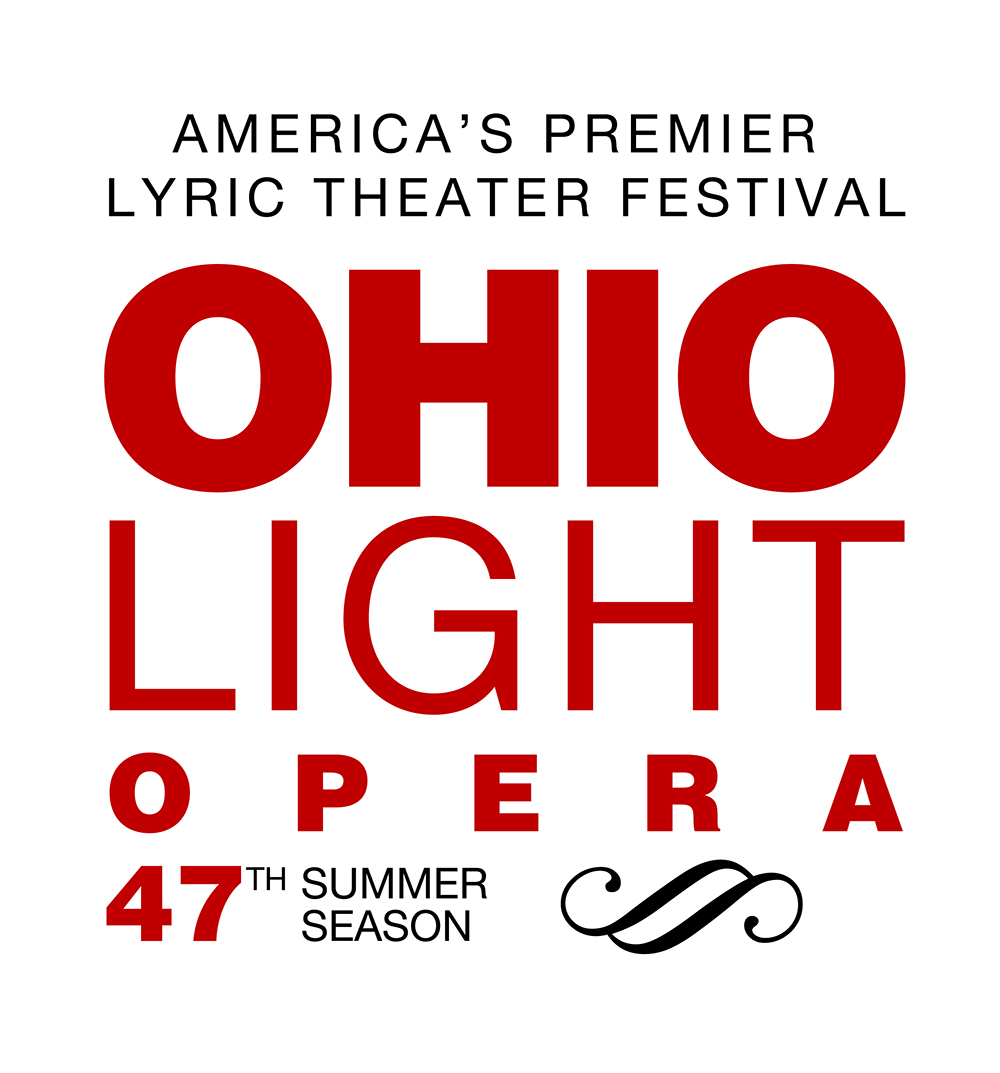
2024 Season

Guys and Dolls
(1950)
Music and Lyrics Frank Loesser
Book Jo Swerling and Abe Burrows
ACT I: Surrounded by Broadway’s seedy street life, horse players Nicely-Nicely Johnson, Benny Southstreet, and Rusty Charlie look over the day’s scratch sheet. They are interrupted by a mission band, led by Sarah Brown, who, denouncing those who wallow in the sin of cards, horses, and dice, invites all to her Save-A-Soul Mission. Gambler Nathan Detroit, always trying to set up a crap game out of the sight of Police Lieutenant Brannigan, laments his financial woes—he cannot even buy a present for chanteuse Adelaide on the 14th anniversary of their engagement. Nathan, desperate for cash so that he can rent a space for his crap game, makes a bet with high-rolling Sky Masterson that Sky cannot persuade Sarah to accompany him to Havana the next day. Posing as a repentant sinner, Sky visits the mission and tries coaxing Sarah into a next-day dinner in Cuba. She refuses, but gradually softens. At the Hot Box Nightclub where she performs, Adelaide tries to entice Nathan into marriage. When she learns that he has reneged on his promise to give up gambling, she becomes furious and lapses into the psychosomatic cold that she has endured for the past 14 years. Mission director General Cartwright tells Sarah that, because of lack of attendance, the mission must be closed. Sky intervenes and guarantees that there will be a dozen sinners at the next meeting—the General is overjoyed. Sightseeing in Havana, Sarah and Sky stop for a milkshake, whose rum flavoring leaves Sarah tipsy, as a brawl breaks out. Back in New York, Sarah and Sky discover that Nathan and his cohorts have been shooting craps in the mission. Sarah, thinking that she has been set up, walks out on Sky.
ACT II: Told that Nathan is off visiting a sick aunt, Adelaide, knowing after all these years what that means, lapses into her sneezing and sniffling. Arvide, Sarah’s grandfather and fellow mission worker, tells her that, if she loves Sky, she should follow her heart and not worry about what he is. Sky, well aware of the promise he had made Sarah, catches up with a big crap game in the sewers and proposes his own game: for each throw he wins, the loser must show up at the mission meeting. One by one the gamblers emerge from the sewer and head to the mission, where they give testimony. Challenges ensue as Brannigan arrives, inquiring about the alleged crap game in the mission, and Sarah and Adelaide meet on the street to discuss their men problems. …
Conductor: Wilson Southerland
Stage Director: Steven Daigle
Choreographer: Spencer Reese
Set Designer: Kiah Kayser
Costume Designer: Bill Brewer
Lighting Designer: Brittany Shemuga
Sound Designer: Christopher Plummer
Assistant Stage Director: Patrick Polsin
Stage Manager: Sami Hansen
The Mother Abbess Sara Nealley* Yvonne Trobe**
Elsa Schraeder Jordan Knapick
Captain Georg von Trapp Vincent Gover* Zachary Elmassian**
Max Detweiler James Mitchell
Maria Rainer, a postulant at Nonnberg Abbey Julia Fedor* Rachel Weinfeld**
Sister Berthe, mistress of novices Madison Barrett
Sister Margaretta, mistress of postulants Arianna Paz
Children of Captain von Trapp
Liesl Ori Marcu* Holly Thomas**
Louisa Lydia Dunlap1 Acadia Webb2
Brigitta Stella Vodilso1 Sophia Brauser2
Marta Maddie Wason1 Vivienne Kist2
Gretl Julianna Wason1 Paige Lewis2
Friedrich Dane Kuzma1 Trevor Grimes2
Kurt Michael Younkin1 Nigel Grimes2
Rolf Gruber Blake Levinson* Nate Petsche**
Sister Sophia Christine Price
Franz, the butler Davian Raggio
Frau Schmidt, the housekeeper Andrea McGaugh
Herr Zeller Michael Koutelos
Frau Zeller Christine Price
Baron Elberfeld Owen Malone
Baroness Elberfeld Arianna Paz
A New Postulant Laura McKenna
Admiral von Schreiber R. Porter Hiatt
Ursula Laura McKenna
Fräulein Schweiger Andrea McGaugh
Singing Trio Owen Malone, Davian Raggio, Nathaniel Richard
SS Soldiers Michael Koutelos, James Covington, Jeron Robinson
Ensemble: Sadiyah Babatunde, Madison Barrett, Madeline Coffey, James Covington, R. Porter Hiatt, Jordan Knapick, Michael Koutelos, Owen Malone, Andrea McGaugh, Laura McKenna, James Mitchell, Arianna Paz, Christine Price, Davian Raggio, Nathaniel Richard, Jeron Robinson
Understudy for Max Detweiler: Nicholas Orth
Cover for Sister Sophia: Sadiyah Babatunde (6/22)
* 6/13, 6/19, 6/29, 7/7, 7/13, 7/20
** 6/15, 6/22, 7/5, 7/11, 7/16, 7/26
1 6/13, 6/22, 6/29, 7/11, 7/13, 7/20
2 6/15, 6/19, 7/5, 7/7, 7/16 (Lydia covers for Acadia), 7/26
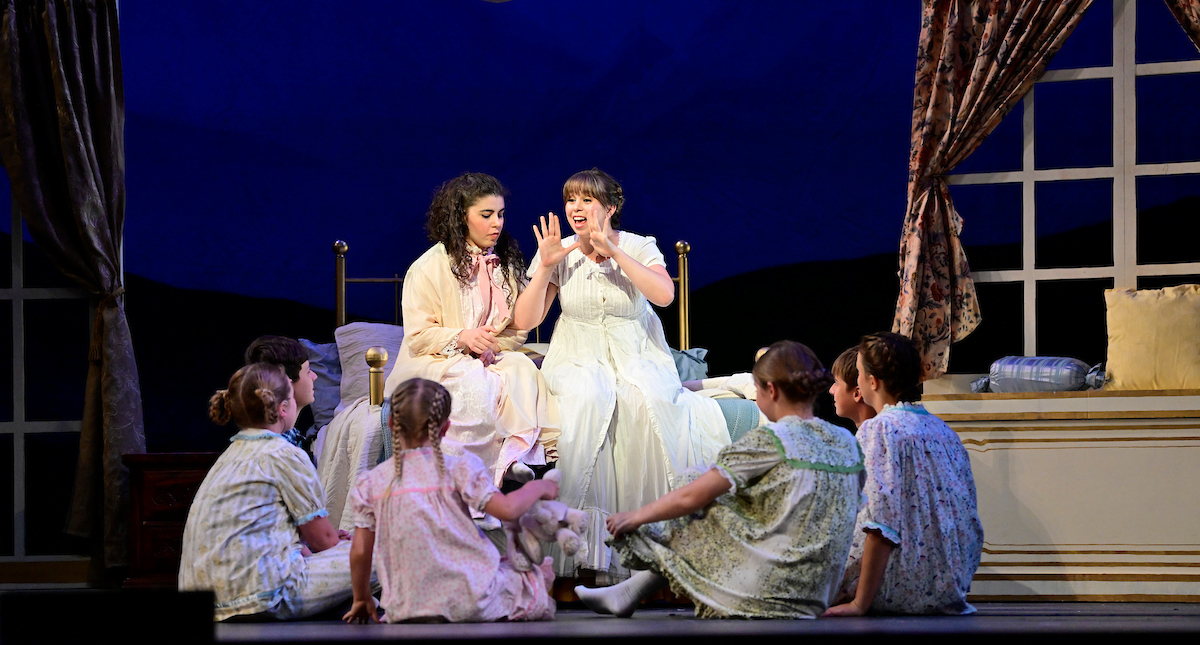
The Sound of Music
(1959)
Music Richard Rodgers
Lyrics Oscar Hammerstein II
Book Howard Lindsay and Russel Crouse
Suggested by “The Trapp Family Singers” by Maria Augusta Trapp
Maria is a nun at an abbey in 1938 Austria, but her personality doesn’t fit the lifestyle practiced within its walls. The Mother Abbess sends her to be governess for the recently widowed Captain von Trapp. Although she quickly wins over his seven children, awakens romantic feelings in him, and strange new feelings in herself, she is confused by these emotions and flees back to the convent. The children are very distraught, especially as their father is to wed the wealthy, not very kind, Elsa Schraeder. The Abbess decides that Maria should not use the convent as an escape from the world and orders that she return as governess. Elsa, meanwhile, breaks off her engagement to von Trapp because of his refusal to accept the encroaching German position. Maria and von Trapp are married, but when offered a commission in the German navy, he realizes that he and his family can no longer remain in Austria. Under the pretense of an entertainment at a local festival, the family manages to escape the clutches of Nazi soldiers and—with the help of both nuns in the abbey and the conscience-stricken former boyfriend of the oldest von Trapp daughter—finds its way to safety through the mountains into Switzerland.
Conductor: Michael Borowitz
Stage Director: Jacob Allen
Choreographer: Spencer Reese
Set Designer: Daniel Hobbs
Costume Designer: Jen Gillette
Lighting Designer: Brittany Shemuga
Sound Designer: Christopher Plummer
Assistant Stage Director: Patrick Polsin
Stage Manager: Sami Hansen
Nathan Detroit James Mitchell
Miss Adelaide Maggie Langhorne* Ori Marcu**
Sarah Brown Christine Price* Madeline Coffey**
Sky Masterson Jack Murphy
Arvide Abernathy Vincent Gover
Harry the Horse William Volmar
Nicely-Nicely Johnson Spencer Reese
General Matilda Cartwright Yvonne Trobe
Big Jule Davian Raggio
Lieutenant Brannigan Zachary Elmassian
Benny Southstreet Jeron Robinson
Rusty Charlie Michael Koutelos
Mimi Rachel Weinfeld
Agatha Julia Fedor
Martha Kate Bilenko
Calvin Nathaniel Richard
Master of Ceremonies Blake Levinson
Joey Biltmore Patrick Polsin
Sioux City Gangster Connor Burns
Ensemble: Sadiyah Babatunde, Madison Barrett, Kate Bilenko, James Covington, Zachary Elmassian, Julia Fedor, Jordan Knapick, Michael Koutelos, Blake Levinson, Laura McKenna, Nicholas Orth, Nate Petsche, Davian Raggio, Nathaniel Richard, Jeron Robinson, William Volmar, Rachel Weinfeld
Understudy for Nathan Detroit: Jacob Allen
Understudy for Sky Masterson: Connor Burns
* 6/8, 6/15, 6/25, 6/30, 7/9,7/20, 7/28
** 6/12, 6/21, 6/28, 7/2, 7/6, 7/12, 7/25
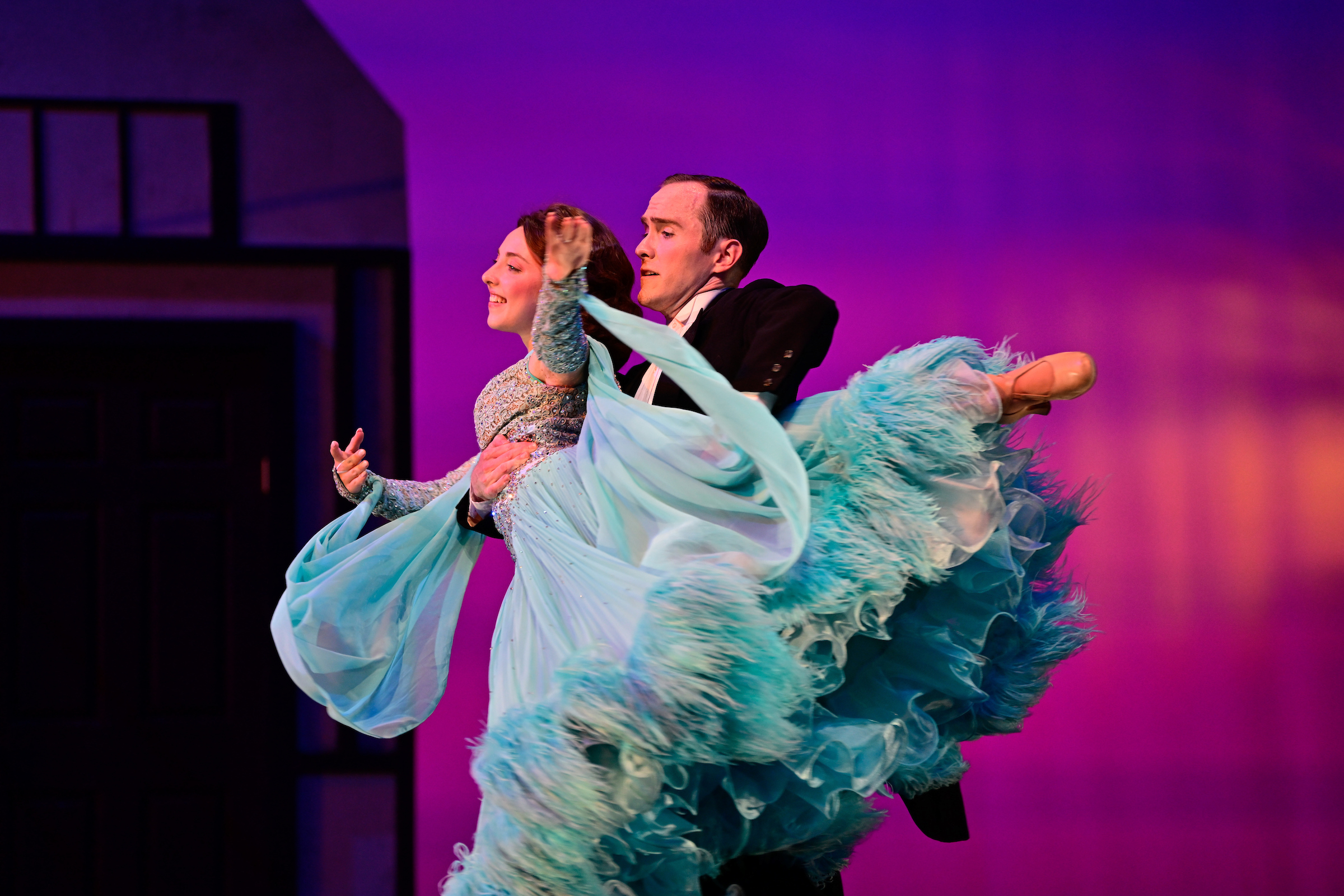
Me and My Girl
(1937)
Music Noel Gay
Book and Lyrics Douglas Furber and L. Arthur Rose
Revised Book Stephen Fry, with contributions by Mike Ockrent
ACT I: As guests head off for a weekend at stately Hareford House, the in-residence family is distraught: The late Earl of Hareford has died without a suitable heir. The family solicitors, after a deep look down the family tree, have tracked down a distant, but legitimate, candidate to assume the family title and property. He is Bill Snibson from Lambeth, unschooled—to say the least—in the ways of polite society. In order to assume the position, he must pass muster with the late Earl’s executors: the formidable Duchess of Dene and Sir John Tremayne. As the Duchess acknowledges that Bill is the very last in the family line, she emphasizes the need for a proper consort for him. No problem, says Bill … he dashes off to his car and brings in girlfriend Sally Smith, equally unaccustomed to the demands and rigor of upper-class behavior. Lady Jacqueline has taken a shine to Bill, as Sally, sensing that she is an obstacle to Bill’s position as Earl, decides to return to Lambeth. But she has a plan up her sleeve.
ACT II: Still with Bill, but observing his sincere efforts to get into the “earlish” way of life, Sally—encouraged by the Duchess—eventually says her goodbye to Bill. His pleas to the Duchess fall on deaf ears as the family portraits come to life and remind him of his noblesse oblige familial responsibilities. Sir John and family solicitor Parchester sympathize with Bill’s romantic plight, as they also have their own challenges with the ladies. Bill tracks down Sally back in Lambeth, but she hides from him and slips away. Back at Hareford, a despondent Bill, still chased by Lady Jacqueline, decides to give it all up and part ways from the family. But Sir John has something else in mind. …
Conductor: Michael Borowitz
Stage Director: Jacob Allen
Choreographer: Spencer Reese
Set Designer: Chyna Mayer
Costume Designer: Jen Gillette
Lighting Designer: Rachel Aho
Sound Designer: Leo Chavolla
Assistant Stage Director: Patrick Polsin
Stage Manager: Carrigan Hughes
Gerald Bolingbroke, a good-looking young man Jack Murphy
Lady Battersby Andrea McGaugh
Lord Battersby Davian Raggio
Lady Jacqueline Carston, a dazzling young blonde Maggie Langhorne* Madison Barrett**
Charles Heatherset, manservant Jeron Robinson
Mr. Parchester, family solicitor James Mitchell
Lord Jasper Tring, a nonagenarian Owen Malone
Maria, Duchess of Dene, a middle-aged martinet Yvonne Trobe
Sir John Tremayne, a middle-aged baronet R. Porter Hiatt
Bill Snibson, Cockney Lord Hareford Spencer Reese
Sally Smith, Bill’s girl Kate Bilenko
Telegraph Boy James Covington
Mrs. Brown, landlady Sarah Nealley
Bob Barking, Sally’s friend William Volmar
Police constable Nathaniel Richard
Ensemble: Sadiyah Babatunde, Connor Burns, James Covington, Julia Fedor, Jordan Knapick, Blake Levinson, Owen Malone, Andrea McGaugh, Laura McKenna, Jack Murphy, Sara Nealley, Nicholas Orth, Arianna Paz, Nate Petsche, Davian Raggio, Nathaniel Richard, Colin RIng, Jeron Robinson, Holly Thomas, William Volmar
Understudy for Bill Snibson: James Covington
Understudy for Sally Smith: Rachel Weinfeld
* 6/20, 6/27, 7/13, 7/17
** 6/22, 6/29, 7/6, 7/25
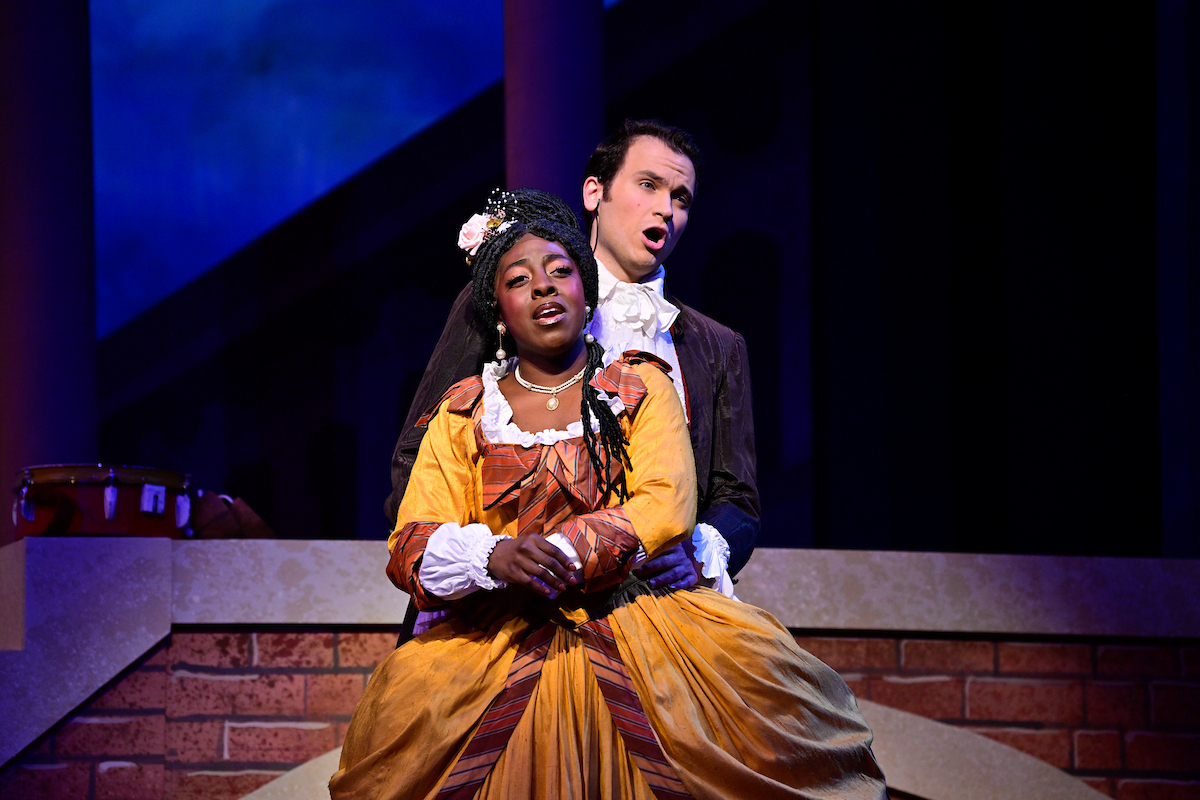
The Gondoliers
(1889)
Music Arthur Sullivan
Libretto William S. Gilbert
ACT I: At birth, Casilda, the now 21-year-old daughter of the Duke and Duchess of Plaza-Toro, was married by proxy to the then infant son and heir of the King of Barataria. Unfortunately, the King became a rather bigoted Wesleyan Methodist, and the Grand Inquisitor, Don Alhambra—determined that such a trend should not continue—arranged for the heir to be kidnapped and taken to Venice. There he was placed in the care of a respectable gondolier who raised him alongside his own son. Now gondoliers themselves, his “sons,” Marco and Giuseppe, have recently selected brides, Gianetta and Tessa, from their large female following. Meanwhile, as the result of an insurrection, the throne of Barataria has been vacated and Casilda’s father, now in hard straits, wishes to establish his daughter as queen. Accompanied by the Duchess, Casilda, and Luiz, he has traveled to Venice in search of his daughter’s missing husband. Upon hearing from her father of her childhood marriage, Casilda is distraught, as she is in love with Luiz, the Duke’s attendant and drummer. Don Alhambra announces that, as Marco and Giuseppe’s “father” has since died, the only person who can identify the prince is Inez, who was his childhood nurse. Emissaries have been sent to bring her to Venice. Until the matter is settled, Marco and Giuseppe agree to rule Barataria jointly—they set out for the island kingdom as their new wives wave goodbye from the canal bank.
ACT II: Settled in Barataria as joint kings, with all their friends appointed to high positions, Marco and Giuseppe lament their menial life and the absence of their wives. Gianetta and Tessa miss their husbands equally and have traveled to Barataria, anxious to learn which of them will be queen. Complications arise when Don Alhambra informs the two gondoliers that not only is one of them a king, but also a bigamist, married two decades earlier to Casilda. Finally, the nurse arrives and is called upon to make her judgment. …
Conductor: Michael Borowitz
Stage Director: Spencer Reese
Choreographer: Spencer Reese
Set Designer: Daniel Hobbs
Costume Designer: Brooke Kesler
Lighting Designer: Rachel Aho
Sound Designer: Adrienne McLaughlin
Assistant Stage Director: Patrick Polsin
Stage Manager: Erin Kimball
The Duke of Plaza-Toro, a Grandee of Spain Vincent Gover
Luiz, his attendant Nicholas Orth
Don Alhambra del Bolero, the Grand Inquisitor Zachary Elmassian
Marco Palmieri, Venetian gondolier Owen Malone* Davian Raggio**
Giuseppe Palmieri, Venetian gondolier William Volmar* Connor Burns**
Inez, foster mother to Marco and Giuseppe Maggie Langhorne
Antonio Michael Koutelos
Francesco Jack Murphy
Giorgio R. Porter Hiatt
Annibale Nate Petsche
The Duchess of Plaza-Toro Andrea McGaugh
Casilda, her daughter Sadiyah Babatunde* Holly Thomas**
Gianetta, contadina Sara Nealley* Laura McKenna**
Tessa, contadina Ori Marcu* Julia Fedor**
Fiametta Christine Price
Vittoria Arianna Paz
Giulia Jordan Knapick
Ensemble: Kate Bilenko, Madeline Coffey, James Covington, R. Porter Hiatt, Jordan Knapick, Michael Koutelos, Blake Levinson, James Mitchell, Jack Murphy, Arianna Paz, Nate Petsche, Christine Price, Nathaniel Richard, Colin Ring, Jeron Robinson, Yvonne Trobe, Rachel Weinfeld
Understudy for Don Alhambra: Nathaniel Richard
Understudy for the Duchess of Plaza-Toro: Arianna Paz
Understudy for Luiz: Colin Ring
* 6/26, 7/10, 7/19, 7/27 ** 6/28, 7/12, 7/24
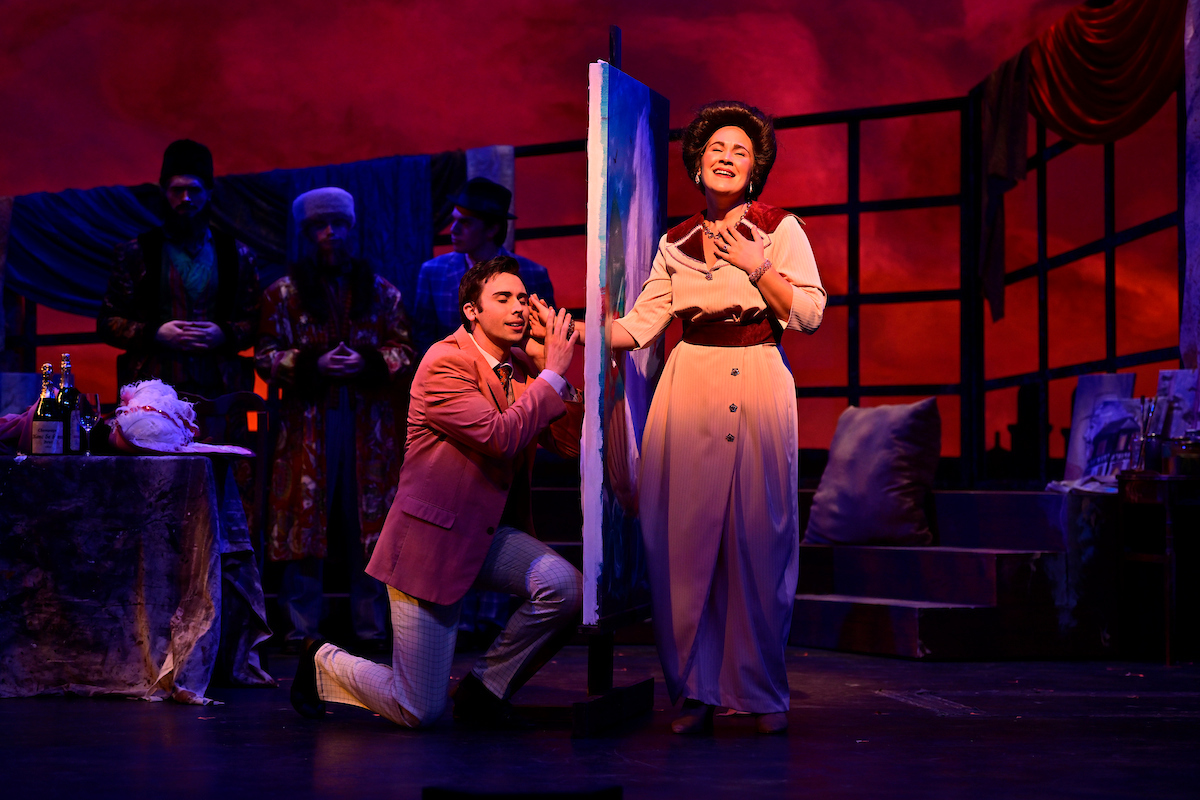
The Count of Luxembourg
(1909)
Music by Franz Lehár
Original German Libretto by Alfred Willner and Robert Bodanzky
English Book by Nigel Douglas
English Lyrics by Eric Maschwitz and Nigel Douglas
ACT I: In Brissard’s Parisian studio, a group of Bohemian friends are enjoying a Mardi Gras party. Brissard’s friend and patron, René, the impoverished Count of Luxembourg, is approached by Prince Basil Basilovitch, who is in love with opera singer Angèle Didier, but is forbidden to marry a commoner. He offers René half a million francs to marry a woman—namely Angèle—whom he will never see; she thus becomes a countess and, after three months, René will divorce her and she will be free to marry the Russian prince. During the three months, René must absent himself from Paris and assume a different name. Basil’s men fetch Angèle, and one of Brissard’s paintings is used as a screen to separate the bride and bridegroom during the ceremony. They treat the ceremony lightheartedly, but each one’s curiosity is aroused.
ACT II: After three months, René returns to Paris, calling himself the Baron de Reval. He has fallen in love with Angèle, whom he visits at her home, but she—unaware of his identity—tells him that she is married. He replies that he is also married, but both reveal that they are in the process of getting divorced. Meanwhile, Brissard has resumed his pursuit of Juliette, his former model, who is now Angèle’s companion. Basil shows up, eagerly anticipating his wedding the next day, and tries to get rid of René. Basil admits to Angèle’s guests that she is married to the Count of Luxembourg. Angèle cynically describes this marriage of convenience, but when she learns that the Count is none other than René, she insists—to his delight and Basil’s fury—that she is still his wife.
ACT III: A short time later at the Grand Hotel, the elderly Countess Stasa Kokozov searches for Basil, whom she claims as her fiancé, with the Tsar’s blessing. Embraced by the Countess, Basil reluctantly agrees that René will stay married to Angèle. René, whose family fortune has been restored, returns the half million francs to Basil. Brissard and Juliette, who have been married at the registry office, join René, Angèle, and their friends in celebrating the triumph of love.
Conductor: Wilson Southerland
Stage Director: Steven Daigle
Choreographer: Spencer Reese
Scenic Designer: Chyna Mayer
Costume Designer: Nichole Watts
Lighting Designer: Rachel Aho
Sound Designer: Madeleine Carroll
Assistant Stage Director: Patrick Polsin
Stage Manager: Claire Alderfer
René, Count of Luxembourg Jack Murphy
Prince Basil Basilovitch Jacob Allen
Countess Stasa Kokozov Maggie Langhorne
Armand Brissard, painter William Volmar
Juliette Vermont Jordan Knapick
Angèle Didier, an opera singer Christine Price
“The Three”
Sergei Mentchikoff Zachary Elmassian
Pavel von Pavlovitch Colin Ring
Pélégrin, a notary R. Porter Hiatt
Anatole Saville, painter Connor Burns
Henri Boulanger, painter Nicholas Orth
Charles Lavigne, painter Spencer Reese
Robert Marchand, painter James Covington
Sidonie, artists’ model Sadiyah Babatunde
Coralie, artists’ model Madison Barrett
François, servant Colin Ring
Manager of the Grand Hotel Davian Raggio
Hostess Ori Marcu
Waiters and Waitresses Madison Barrett, Michael Koutelos, Spencer Reese
Ensemble: Sadiyah Babatunde, Madison Barrett, Kate Bilenko, Connor Burns, Madeline Coffey, James Covington, Zachary Elmassian, Vince Gover, R. Porter Hiatt, Jordan Knapick, Michael Koutelos, Maggie Langhorne, Ori Marcu, Andrea McGaugh, Nicholas Orth, Arianna Paz, Nate Petsche, Spencer Reese, Davian Raggio, Colin RIng, Holly Thomas, Rachel Weinfeld
Understudy for René: Owen Malone
Understudy for Juliette Vermont: Rachel Weinfeld
Understudy for Angèle Didier: Sara Nealley
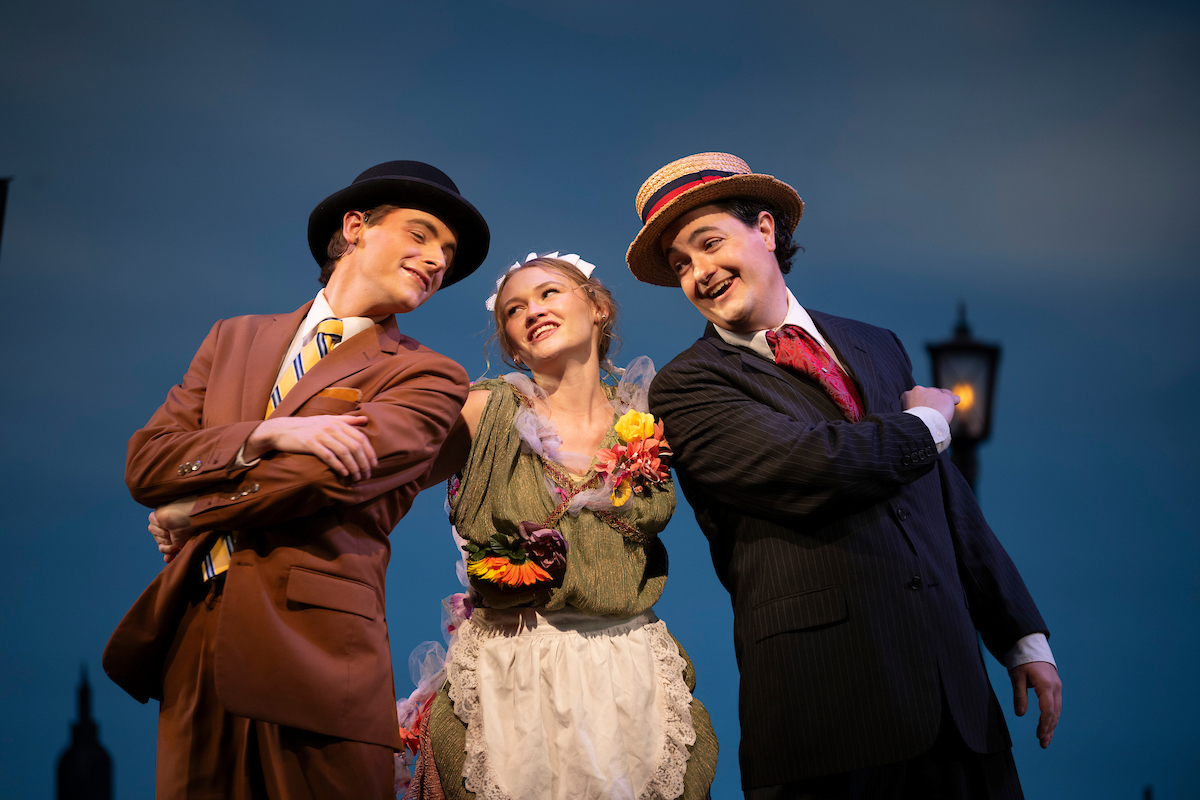
The Arcadians
(1909)
Music by Lionel Monckton and Howard Talbot
Lyrics by Arthur Wimperis
Book by Mark Ambient, Alexander M. Thompson,and Robert Courtneidge
ACT I: Shepherds and nymphs celebrate the simple life in Arcadia, a land that time has forgotten. Sombra describes to them a place called London, where everyone lives in cages of brick and stone and where nobody tells the truth. The Arcadians’ desire to see these “monsters” is unexpectedly fulfilled when James Smith, a middle-aged London caterer, crash-lands his flying machine in the midst of Arcadia. He flirts with Sombra, then lies to her that Astrophel no longer loves her, but rather Chrysaea. Appalled by the lie, the Arcadians dip Smith in the Well of Truth. He emerges as a youthful shepherd named Simplicitas, anxious to indulge in the pleasures of Arcadian life. But Sombra insists that he return to London with her and Chrysaea to preach the simple life and banish lies.
ACT II: London’s smart set have gathered at the Askwood racecourse, where Jack Meadows has bet a huge sum on his horse Deuce. His attention is diverted by the charming Eileen Cavanaugh, the niece of James’ wife Mrs. Smith. Suddenly, a storm hits, at the end of which Sombra, Chrysaea, and Simplicitas appear. The Londoners take them for circus performers and are unimpressed by Sombra’s message extolling Arcadian truth, beauty, and youth. Mrs. Smith is smitten with the youthful looks of Simplicitas, who reminds her of James when he was courting her. Simplicitas succumbs to her urging and agrees to help her open a new restaurant called Arcadia in London. Jack hints that he will propose to Eileen after Deuce has won the race. But his jockey, the dour Peter Doody who has never won a race, is injured by Deuce. When Sombra volunteers to recruit a new jockey, Jack impulsively kisses her, making Eileen jealous. Sombra enlists Simplicitas to ride Deuce and, after an unpromising start, Deuce wins by a nose.
ACT III: Mrs. Smith’s new restaurant—with its fake Arcadian decor, waitresses costumed as nymphs, and Peter Doody as a waiter named Ganymede—is a smashing success. Jack and Eileen are about to make up, but she becomes jealous again when he betrays an interest in the waitresses and is caught kissing Sombra again. Simplicitas, far from preaching Arcadian truth, has become the darling of the smart set for the way he appreciates London’s pleasures. Sombra persuades Eileen that Jack truly loves her, but she becomes suspicious of Simplicitas and begins to yearn for home. When Doody deduces that Simplicitas is really James Smith, the Arcadians’ mission in London begins to unravel, especially when Simplicitas lies about his identity and tumbles into the restaurant’s well of truth. …
Conductor: Wilson Southerland
Stage Director: Steven Daigle
Choreographer: Spencer Reese
Scenic Designer: Kiah Kayser
Costume Designer: Suwatana Rockland
Lighting Designer: Brittany Shemuga
Sound Designer: Leo Chavolla
Assistant Stage Director: Patrick Polsin
Stage Manager: Sami Hansen
James Smith/Simplicitas Vincent Gover
Sombra Laura McKenna
Chrysaea Holly Thomas
Eileen Cavanaugh Madison Barrett
Jack Meadows Spencer Reese
Bobbie James Mitchell
Peter Doody Connor Burns
Mrs. Smith Yvonne Trobe
Amaryllis Madeline Coffey
Astrophel Colin RIng
Strephon R. Porter Hiatt
Father Time Zachary Elmassian
Sir George Paddock Jack Murphy
Lady Barclay Arianna Paz
Percy Marsh Blake Levinson
Soloists Act I: Sara Nealley, Act III: Blake Levinson
Ensemble: Kate Bilenko, Madeline Coffey, Zachary Elmassian, Julia Fedor, R. Porter Hiatt, Michael Koutelos, Maggie Langhorne, Blake Levinson, Owen Malone, Ori Marcu, Andrea McGaugh, James Mitchell, Jack Murphy, Sara Nealley, Arianna Paz, Christine Price, Nathaniel Richard, William Volmar
2023 Season

Camelot
(1960)
Music Frederick Loewe
Book and Lyrics Alan J. Lerner
Based on the novel The Once and Future King by T. H. White
ACT I: On a wintry morning, King Arthur’s court greets the arrival of Guenevere, the King’s soon-to-be bride. Arthur is nervous at becoming a bridegroom; Guenevere is more romantically inclined in her new position as Queen of England, but equally uncertain. When they meet unexpectedly, he outlines the pleasures of life in Camelot. Each charmed by the other’s lack of court etiquette and formality, they are happily married as King and Queen. Arthur’s tutor, the magician Merlyn, is lured away from Camelot and is unable to warn the king of imminent dangers. Arthur has learned the wisdom of peaceful ways from Merlyn and has brought tranquility and justice to his domain through the establishment of the celebrated Round Table. News of the Table has even reached France, engaging the sympathies of young Lancelot du Lac, who arrives at Camelot proclaiming his intentions to serve King Arthur. Lancelot, in the view of the court and Guenevere, is insufferable; she encourages the castle knights to challenge him to a joust. Arthur tries to dissuade her from siding against Lancelot, but the Queen is adamant. Lancelot is victorious, exhibiting a strange power of faith and purity, thereby gaining the respect of the court and of the Queen. His feelings towards Guenevere speedily develop into a deep but silent love, putting to test the principles of the Round Table and Lancelot’s true love for the King he serves.
ACT II: Two years pass—Lancelot and Guenevere still strive to conceal their love. Arthur is aware of their feelings, but covers his resentment to preserve peace in Camelot. Rumors of the relationship attract the young squire Mordred, Arthur’s illegitimate son, who loathes Arthur’s dreams of peace and intends to disrupt the kingdom in the hope that he may ascend to the throne. Through Mordred’s scheme, Arthur is trapped in the enchanted forest of Mordred’s aunt, Morgan Le Fey, who casts a sleeping spell over the King. Lancelot visits Guenevere in her chambers, where Mordred overhears them confess their love and accuses them of treason. Lancelot escapes, but Guenevere is sentenced to burn at the stake. At the last moment, Lancelot rescues Guenevere and takes her to France, and Arthur is forced to make war on his friend. Just before their final battle, Arthur meets both Guenevere and Lancelot, and discovers that they are no longer together. Realizing that all he has fought for is gone, Arthur forgives Guenevere. He discovers a young stowaway who aspires to join the Round Table. He knights the boy and sends him back to England, charging him, when he grows up, to tell another generation of the noble ideas of Camelot.
Conductor Michael Borowitz
Stage Director Steven A. Daigle
Choreographer Spencer Reese
Scenic Designer Daniel Hobbs
Costume Designer Suwatana Rockland
Lighting Designer Brittany Shemuga
Sound Designer Christopher Plummer
Assistant Sound Designer and Operator Angie Gecosky
Stage Manager Sami Hansen
Assistant Stage Director Patrick Polsin
Guenevere Sara Lucille Law* Sadie Spivey**
Lancelot Du Lac Matthew Mueller* Nathan Seldin**
King Arthur James Mitchell
Pellinore Vincent Gover
Merlyn Vincent Gover
Mordred Matthew Reynolds
Morgan Le Fey Michelle Pedersen
Nimue Sophia Masterson
Sir Dinadan Spencer Reese
Sir Sagramore Kolby Kendrick
Sir Lionel Alexander Spence
Squire Dap Nicholas Orth
Lady Anne Margaret Langhorne
Lady Sybil Lily Graham
Bliant Benajmin Rorabaugh
Castor Jack Murphy
Clarius Colin Ring
Colgrevance Marvin Holt
Guilliam Owen Malone
A Page Davian Raggio
Soloists in “Guenevere!” Solo 1 Kolby Kendrick Solo 2 Bergen Price
Tom of Warwick Lydia Dunlap*** Sophia Masterson****
Knights and Ladies-in-Waiting: Lily Graham, Marvin Holt, Meg Johnson, Kolby Kendrick, Margaret Langhorne, Owen Malone, Sophia Masterson, Jack Murphy, Nicholas Orth, Charles Austin Piper, Bergen Price, Christine Price, Davian Raggio, Spencer Reese, Colin Ring, Benjamin Rorabaugh, Alexander Spence, Elizabeth Stassen
Understudy for King Arthur: Charles Austin Piper
*6/10, 6/17, 6/27, 7/7, 7/18, 7/23, 7/30
**6/14, 6/23, 7/1, 7/15, 7/20, 7/28
***6/10, 6/14, 6/23, 6/27, 7/1, 7/20, 7/23, 7/28, 7/30
****6/17, 7/7, 7/15, 7/18

How to Succeed in Business Without Really Trying
(1961)
Music and Lyrics by Frank Loesser
Book by Abe Burrows, Jack Weinstock, and Willie Gilbert
ACT I: With one hand on a squeegee and the other grasping the book How to Succeed in Business Without Really Trying, window washer J. Pierrepont Finch has his heart set on pursuing an exalted career inside the building of the World Wide Wicket Company rather than outside. On his way to the personnel office, Finch both knocks over company president J. B. Biggley and catches the admiring eye of secretary Rosemary, who offers to help him in his job pursuit. Finch smart-talks his way to a job in the mail room, as Rosemary delights in finding someone for whom she would be happy to “keep a dinner warm.” In his quest for a higher position, Finch is challenged by fellow mail room employee and promotion-seeking Bud Frump, the nephew of Biggley’s wife. When Finch is chosen to succeed the retiring mail room head, he slyly suggests that Frump would be a better man for the job. His altruism does not go unnoticed by Biggley, as Finch is given a junior executive post in plans and systems. The happily married but fun-loving Biggley, in the meantime, has added the voluptuous Hedy La Rue—formerly cigarette girl at the Copacabana—to the secretarial staff and assigned her to Finch. Through wily and opportune manipulation of the corporate hierarchy, the rising young executive, always with guidebook in hand, is eventually appointed vice-president of advertising.
ACT II: Rosemary’s joy at being designated Finch’s secretary turns to disenchantment when he continually sees her as his typing machine rather than fiancée. She contemplates resignation, but is convinced by the secretarial pool to stick it out and hope his attitude changes. Biggley, meanwhile, has managed to dissuade Hedy from over-reacting to her growing displeasure with office life and returning to the Copacabana. Frump’s plot to humiliate his rival in Biggley’s eyes backfires as the cunning Finch enlists the aid of Hedy in mounting a business-boosting, prize-offering TV campaign. The effort falls embarrassingly short and Finch, summoned before the company chairman Womper, is facing his first competency crisis and the apparent end of his ascent up the company ladder. At least he still has Rosemary, who will stand by him—whether as executive or window washer. However … a bit more Finch magnanimity and a few fortuitous turns of events and … voilà!
Conductor Wilson Southerland
Stage Director Jacob Allen
Choreographer Spencer Reese
Scenic Designer Kiah Kayser
Costume Designer Amber Cook
Lighting Designer Brittany Shemuga
Sound Designer Christopher Plummer
Associate Sound Designer and Operator Angie Gecosky
Stage Manager Sami Hansen
Assistant Stage Director Patrick Polsin
J. Pierrepont Finch Spencer Reese
J. B. Biggley Vincent Gover
Rosemary Pilkington Louisa Waycott
Gatch Nicholas Orth
Bratt Colin Ring
Miss Jones Michelle Pedersen
Mr. Twimble James Mitchell
Hedy LaRue Bergen Price
Wally Womper Kolby Kendrick
Bud Frump Matthew Reynolds
Smitty Madison Barrett
Miss Krumholtz Julia Fedor
Ovington Charles Austin Piper
Jenkins Jack Murphy
Scrubwomen Christine Price, Tzytle Steinman
The Voice of the Book James Mills
Workers of the World Wide Wicket Company:
Madison Barrett, Julia Fedor, Lily Graham, Marvin Holt, Meg Johnson, Sophia Masterson, Matthew Mueller, Jack Murphy, Charles Austin Piper, Christine Price, Davian Raggio, Colin Ring, Nathan Seldin, Alexander Spence, Sadie Spivey, Tzytle Steinman
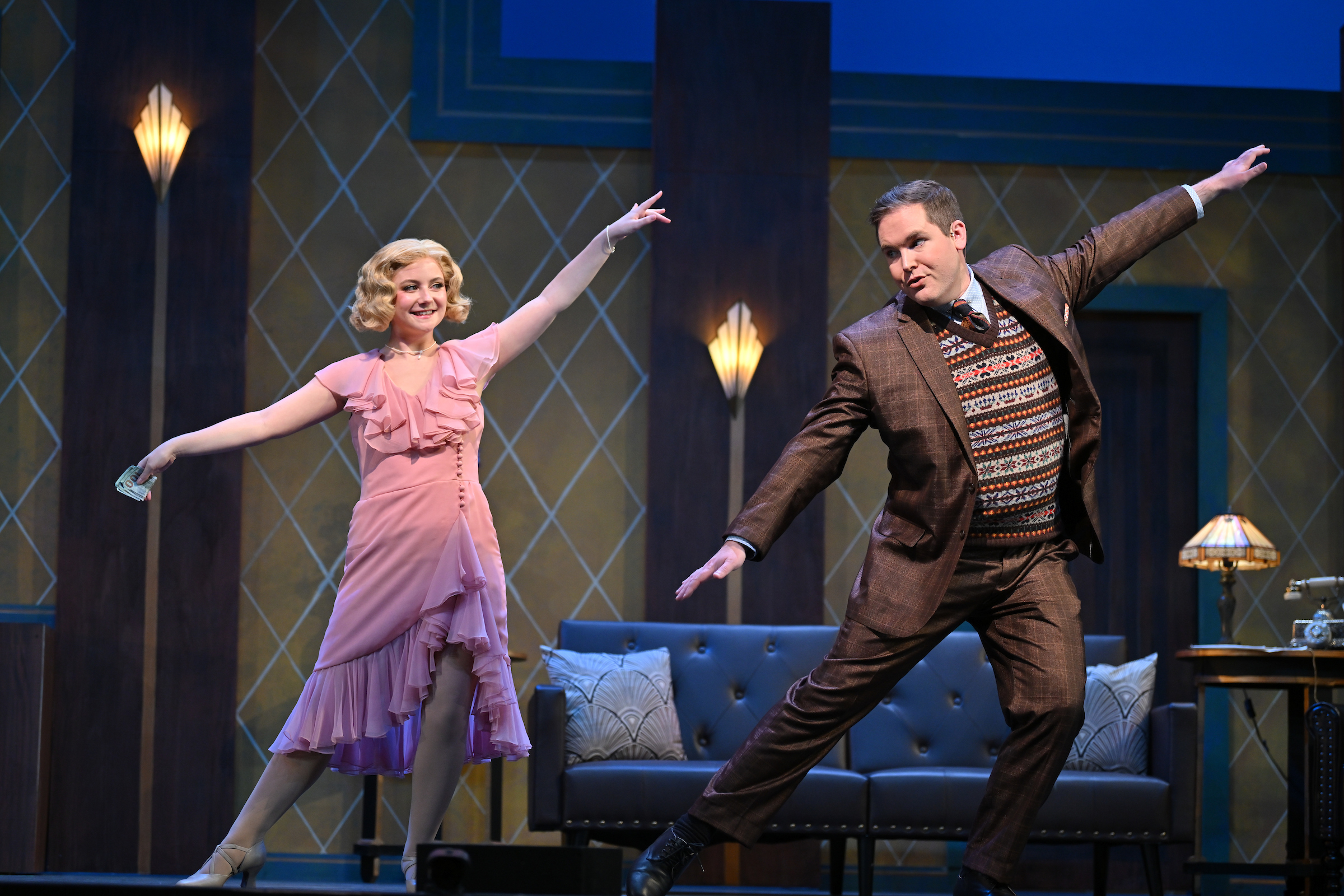
No, No, Nanette
(1925)
Music Vincent Youmans
Lyrics Irving Caesar and Otto Harbach
Book Otto Harbach and Frank Mandel
ACT I: Bible publisher Jimmy Smith has done quite well for himself in business. He shares his home with his frugal, straightlaced, and loving wife Sue, servant Pauline, and Nanette—the daughter of friends of Sue—who has been raised in the proper fashion by the Smiths. Sue is hesitant to let the sheltered Nanette join her flapper friends for a weekend at Jimmy’s seaside cottage, even after family lawyer Billy Early extolls the virtue of the sea. Lucille, Billy’s wife, is Sue’s best friend, but a total opposite when it comes to spending her husband’s money. Nanette’s boyfriend Tom, a bit of a stick in the mud, is distraught when she tells him that she wants to “raise a little hell first” before settling down to married life. When Jimmy arrives home, he tries to encourage Sue to spend some of his money on herself, but her frugality gets the better of her. The frustrated Jimmy, with a great sense of joy, gives Nanette $20 to go on a shopping spree—she is equally ecstatic. However … Jimmy’s generosity is not limited to the “daughter” he helped raise. He repentantly reveals to his lawyer Billy that he has opened charge accounts for three pretty flappers, Betty, Winnie, and Flora, and offers Billy a sizable fee to extricate him from these commitments. Meanwhile, Nanette, on her way shopping, has refused to tell Tom where she got the $20—they quarrel. Panic ensues when Flora phones and informs Jimmy that she is coming to town. Lucille has overhead part of the conversation, gets suspicious of what Jimmy and Billy might be up to, and convinces Sue to hire a private detective.
ACT II: Jimmy has joined Nanette at his seaside cottage, but is unaware that Billy has apparently instructed the three young ladies to make an appearance there. But, in fact, Billy has made no such request. Maybe Lucille and Sue are behind this. Nanette has to do some fast talking when Tom appears and is aghast at the thought that his girlfriend has spent the night there with a married man. The plot thickens as Betty, Winnie, and Flora show up at the cottage, as does Lucille, who reveals that Flora had earlier popped up at Jimmy’s house and expects to marry him. Billy does some fast thinking and concocts a story that quells any thought that the trio of ladies may have of tapping big-time into Jimmy’s wealth. Sue arrives, spots the three ladies, and becomes convinced that it is Billy, not her husband, who is the womanizer. But she quickly changes her mind when she discovers that Nanette is also there. All agree that everyone must remain at the cottage until tempers settle down.
ACT III: Betty, Winnie, and Flora are eager for Billy to provide them a financial settlement and be on their way home. Lucille, led to believe that Billy is the ladies’ man, fears that she may be losing him. But she has a change of heart when she remembers that he has no money and could not be the one who was lavishing gifts on the three ladies. When she finally learns that Jimmy, in fact, is the sugar daddy, she dreads having to break the news to her friend Sue. It remains for the three ladies to calm Sue down and convince her that the road to happiness with Jimmy is to spend his money and doll herself up for him. The three ladies depart, as Lucille and Billy, and Sue and Jimmy, mend their differences. It remains only for the fun-loving Nanette and stiff-necked Tom to reconcile their life philosophies.
Conductor Michael Borowitz
Stage Director Steven A. Daigle
Choreographer Spencer Reese
Scenic Designer Daniel Hobbs
Costume Designer Brooke Kesler
Lighting Designer Rachel Aho
Sound Designer and Operator Angie Gecosky
Stage Manager Amanda Pordon
Assistant Stage Director Patrick Polsin
Jimmy Smith, New York bible publisher Jacob Allen
Sue Smith, his wife Bergen Price
Nanette, their protegée Sadie Spivey
Billy Early, a lawyer Spencer Reese
Lucille Early, his wife Julia Fedor
Tom Trainor, their nephew Alexander Spence
Pauline, the Smith’s cook Louisa Waycott
Betty, from Boston Elizabeth Stassen
Winnie, from Washington Lily Graham
Flora, from San Francisco Madison Barrett
Nanette’s Friends
Lillian Mays Christine Price
Alorna Webb Sophia Masterson
Alivana Margaret Langhorne
Grace Tzytle Steinman
Wives
Mrs. Webster-Wylie Lily Graham
Mrs. Townley-Morgan Elizabeth Stassen
Mrs. Holmes-Gore Madison Barrett
Bachelors Kolby Kendrick, Nicholas Orth, Matthew Reynolds, Nathan Seldin
Husbands Marvin Holt, James Mitchell, Davian Raggio
Maids and Servants Sara Lucille Law, Owen Malone, Colin Ring, Benjamin Rorabaugh
Ensemble: Madison Barrett, Lily Graham, Marvin Holt, Kolby Kendrick, Margaret Langhorne, Sara Lucille Law, Sophia Masterson, James Mitchell, Owen Malone, Nicholas Orth, Christine Price, Davian Raggio, Matthew Reynolds, Colin Ring, Benjamin Rorabaugh, Nathan Seldin, Elizabeth Stassen, Tzytle Steinman
Understudy for Nanette: Lily Graham
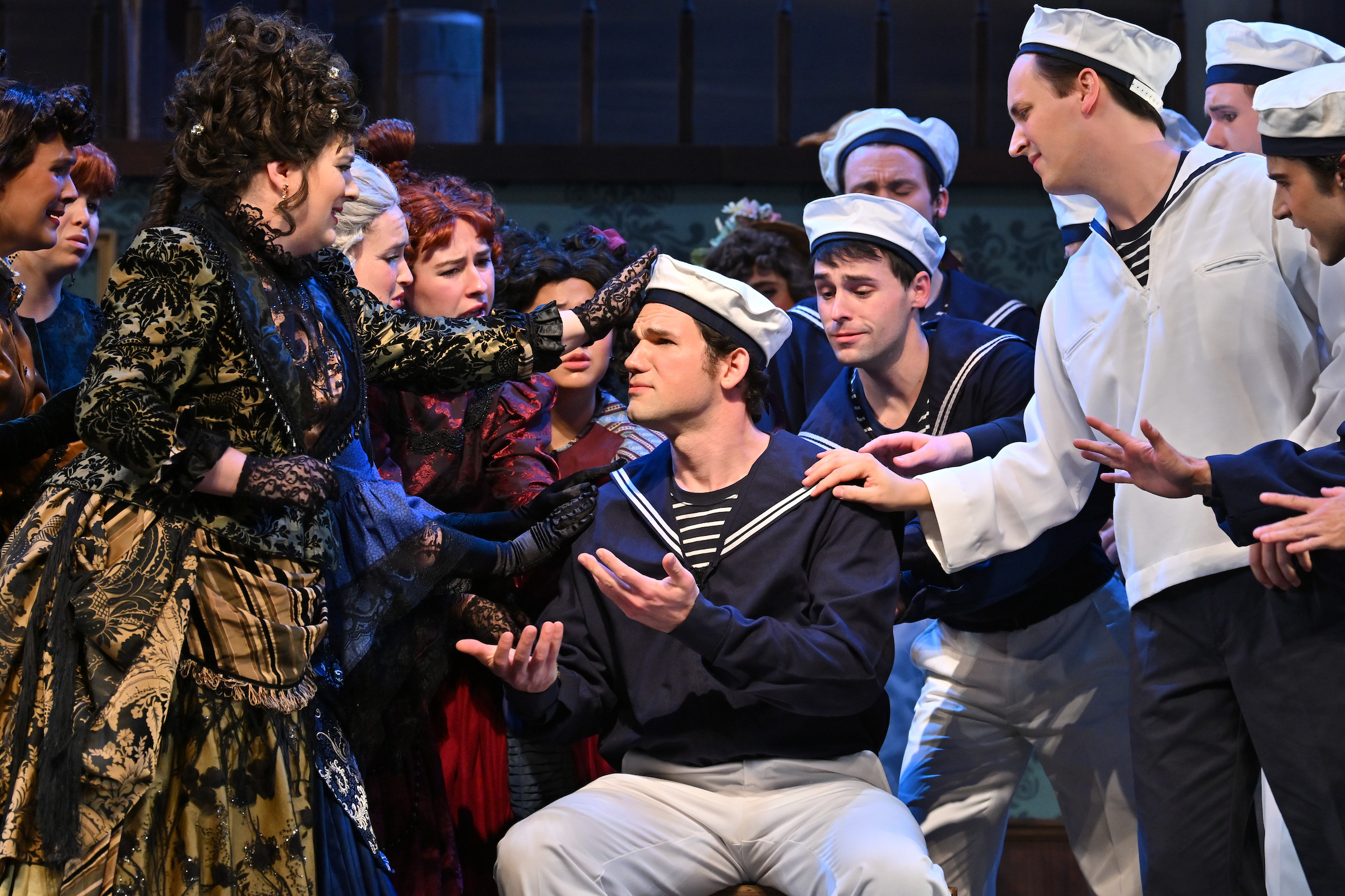
H.M.S. Pinafore
(1878)
Music Arthur Sullivan
Libretto William S. Gilbert
ACT I: High spirits prevail aboard the H.M.S. Pinafore as bumboat woman Little Buttercup distributes sweets and tobacco to the crew. Seaman Ralph Rackstraw’s mind, however, is on Josephine, the daughter of their Captain Corcoran. He is in love with her even though she is socially unattainable. Unaware of his affection, Josephine is in love with Ralph, but pride prevents her from revealing this because of his low station. Josephine, meanwhile, is sought in marriage by Sir Joseph Porter, First Lord of the Admiralty, whose advances she refuses to acknowledge. Sir Joseph holds strong views about the treatment of sailors—he maintains that a British sailor is any man’s equal (excepting his own) and should always be treated with politeness, without recourse to bad language or abuse. This inspires Ralph to declare his love to Josephine, who soon forgets her pride and confesses her true feelings to him. Plans are quickly made to smuggle the couple ashore that night to be married.
ACT II: The Captain tries to explain to Sir Joseph that his daughter’s indifference toward him is explained by her bedazzlement at his exalted rank. Meanwhile, the only crewmember who is not happy at the news of the pending elopement is the cantankerous Dick Deadeye. He betrays their intentions to the Captain and the young couple are caught before they can leave the ship. Furious at Ralph’s actions, the Captain loses his cool and utters a swear word that is, unfortunately, overheard by Sir Joseph. He is appalled at such an outburst and turns to Ralph for an explanation. Unfortunately, Ralph only makes matters worse by revealing that he is in love with Josephine. Sir Joseph wastes no time in sentencing the young sailor to the dungeon cell. All looks hopeless for the two lovers … but Little Buttercup still has an ace up her sleeve.
Conductor Wilson Southerland
Stage Director Spencer Reese
Choreographer Spencer Reese
Scenic Designer Chyna Mayer
Costume Designer Newman Jones
Lighting Designer Kharla Landrau
Stage Manager Alison Harvey
Sound Designer Angie Gecosky
Assistant Stage Director Patrick Polsin
Captain Corcoran Jacob Allen
Josephine Sara Lucille Law* Sophia Masterson**
Ralph Rackstraw Benjamin Rorabaugh
Little Buttercup Tzytle Steinman
Sir Joseph Porter Vincent Gover
Bill Bobstay, boatswain’s mate Matthew Reynolds
Dick Deadeye Charles Austin Piper* Matthew Mueller**
Bob Beckett, carpenter’s mate Kolby Kendrick
Cousin Hebe Margaret Langhorne
Sailors and Sisters, Cousins, and Aunts of Sir Joseph: Madison Barrett, Julia Fedor, Marvin Holt, Meg Johnson, Kolby Kendrick, Margaret Langhorne, Owen Malone, Jack Murphy, Nicholas Orth, Michelle Pedersen, Christine Price, Davian Raggio, Matthew Reynolds, Colin Ring, Nathan Seldin, Alexander Spence, Elizabeth Stassen, Louisa Waycott
Understudy for Ralph Rackstraw: Owen Malone
* 6/29, 7/7, 7/13, 7/25
** 7/5, 7/11, 7/22, 7/28
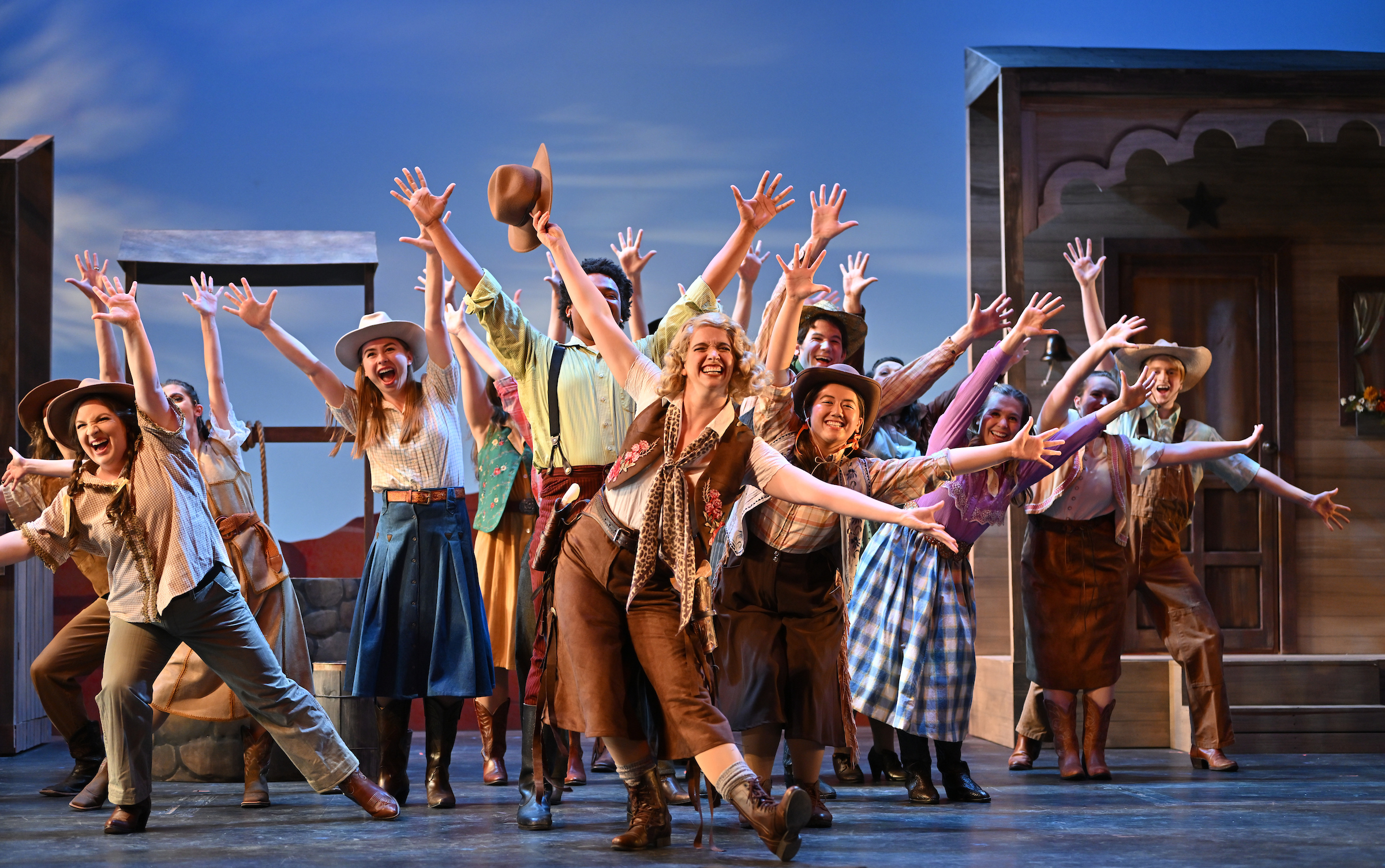
Arizona Lady
(1954)
Music Emmerich Kálmán
Original German Libretto Alfred Grünwald and Gustav Beer
English Translation/Adaptation Steven A. Daigle
ACT I—Scene 1: Hungarian emigrant and Sunshine Ranch owner Lona Farrell has just fired her manager, Jim Slaughter, for trying to kiss her. She is left with no one to ride her prize racehorse, Arizona Lady. The sheriff arrives, makes no secret of his warm feelings for Lona, and informs her that a cattle thief from Colorado named Burt Morton is feared to be in the area. Nelly, the proprietress of a mobile store, tries to peddle her wares to the gathered crowd. The cowboy Roy Dexter, guitar in hand, arrives at the ranch and, despite his lack of references and Lona’s fear for the worst when he reveals that he is from Colorado, is hired as the new manager. Ranch apprentice Chester tries to win the affection of Nelly. The rich neighbor Lopez approaches Lona with an offer to buy Arizona Lady, who he recognizes is fierce competition for his own race entry, Mexican Cavalier.
Scene 2: Having agreed to ride Arizona Lady, Roy has spent the night sleeping in her stable. Lona arrives, as it becomes clear that the couple’s earlier agreement to speak only of business matters has been superseded by their mutual attraction. After Lona departs, Roy launches into a love song to the horse, speaking of taming her and having her eating out of his hand. Lona, still close enough to overhear these words, becomes outraged as she assumes the words are intended for her.
Scene 3: At the race, Nelly has received a letter from her sister Magnolia, who fears that she will lose her fiancé Charlie if he finds out that she has an illegitimate child. She has, in fact, told him that the child belongs to Nelly. Charlie has agreed to adopt, but only if Nelly sends them $2000. Lopez and Slaughter rendezvous and plot to ensure that Arizona Lady does not win the race. The jealous sheriff tells Lona that he is betting on Mexican Cavalier—he likes Arizona Lady but does not like its rider. The race begins—Arizona Lady leads the entire way until the very end, when she falls. Mexican Cavalier, ridden by Jim Slaughter, is the winner. Nelly receives her $2000—Chester had bet on every horse in the race. When Roy reveals that his saddle-girth had been severed, Lopez puts the case to the race judges, who concur in the announced outcome. Lopez suggests that Roy leave town before suspicions are aroused concerning his Colorado background. Lona convinces Roy to stay on as all revel in the glories of their home state.
ACT II—Scene 4: Back at the Sunshine Ranch, Lopez and Slaughter plot the kidnapping of Arizona Lady, as feelings between Roy and Lona are heating up again. Nelly gives Roy the $2000 and asks him to deliver it to Magnolia in Kentucky. Lona introduces Dolores, a dancer from the Paradise Bar in Nogales, who entertains the party guests. The sheriff quizzes her about her acquaintance with a certain cowboy from Colorado. Pointing at Roy, she says that she indeed knows this man and that his name is Burt Morton. Roy is arrested—the sheriff finds on him $2000, as Lona, misconstruing the situation, is dismayed. A ranch hand enters and announces that Arizona Lady has been kidnapped and Chester is missing. Roy is led off to jail.
Scene 5: At the county jail in Nogales, the imprisoned Roy sings of how, among all the blooming roses and shining stars, one woman alone has become his total happiness. Roy’s cell mate Bentschley reveals that he has formulated a breakout plan—both men escape and are soon over the border and outside American jurisdiction.
Scene 6: At the Paradise Bar in Nogales—half in Mexico and half in the United States—the sheriff is startled to catch sight of Roy, who makes sure that he stays on the Mexican side. Roy agrees to give himself up if the sheriff will allow him ten minutes with Lona. Chester, to Nelly’s great joy, is brought in by two thieves, who want nothing more than to be rid of him. When Lona arrives, Roy explains to her that, as a young boy, his father had been shot dead before his eyes by horse thieves. He had vowed to avenge his father’s memory, and has finally succeeded. He tells her that Lopez was the head thief and that Slaughter is really Burt Morton. Both have just been arrested and Arizona Lady has been recovered. Lona asks Roy to continue in his job, but he refuses, asking that his only souvenir from the Sunshine Ranch be Arizona Lady, which Lona happily agrees to gift him.
Scene 7: At the Kentucky Derby, Lona and the sheriff make a wager that if Arizona Lady wins, the two will be married. Roy has entered the horse in the big race, but is not her rider, and is distressed to learn of the wager, especially when Arizona Lady wins the race. The sheriff, however, realizing that Lona’s heart beats only for Roy, releases her from the bet and bids them a happy life together in Arizona.
Conductor Wilson Southerland
Stage Director Jacob Allen
Choreographer Spencer Reese
Scenic Designer Kiah Kayser
Costume Designer Brooke Kesler
Lighting Designer Rachel Aho
Sound Designer Rainey Alexiev
Stage Manager Jayden Dudley
Assistant Stage Director Patrick Polsin
Lona Farrell, owner of the Sunshine Ranch Louisa Waycott
Harry Sullivan, sheriff Charles Austin Piper
Chester Kingsbury, Jr., from the city Spencer Reese
Nelly Nettleton, owner of grand bazaar Tzytle Steinman
Roy Dexter, cowboy Jack Murphy
Lopez Ibañez, wealthy rancher James Mitchell
Jim Slaughter, former ranch foreman Alexander Spence
Bill Sanders, cowboy Owen Malone
Cavarelli, mind reader and fortune teller Matthew Reynolds
Carnival barker Benjamin Rorabaugh
Dolores Delaney, performer Lily Graham
Algernon Galahad Bentschley, extortionist Colin Ring
Peligreen, warden of the jail Benjamin Rorabaugh
Molly Margaret Langhorne
Spike, henchman for Ibañez Kolby Kendrick
Jeremy, bartender Marvin Holt
Street singer Elizabeth Stassen
Race judge Spiro Matsos
Ensemble: Madison Barrett, Julia Fedor, Vincent Gover, Lily Graham, Marvin Holt, Meg Johnson, Kolby Kendrick, Margaret Langhorne, Sara Lucille Law, Owen Malone, Spiro Matsos, Matthew Mueller, Michelle Pedersen, Charles Austin Piper, Bergen Price, Colin Ring, Benjamin Rorabaugh, Alexander Spence, Sadie Spivey, Elizabeth Stassen
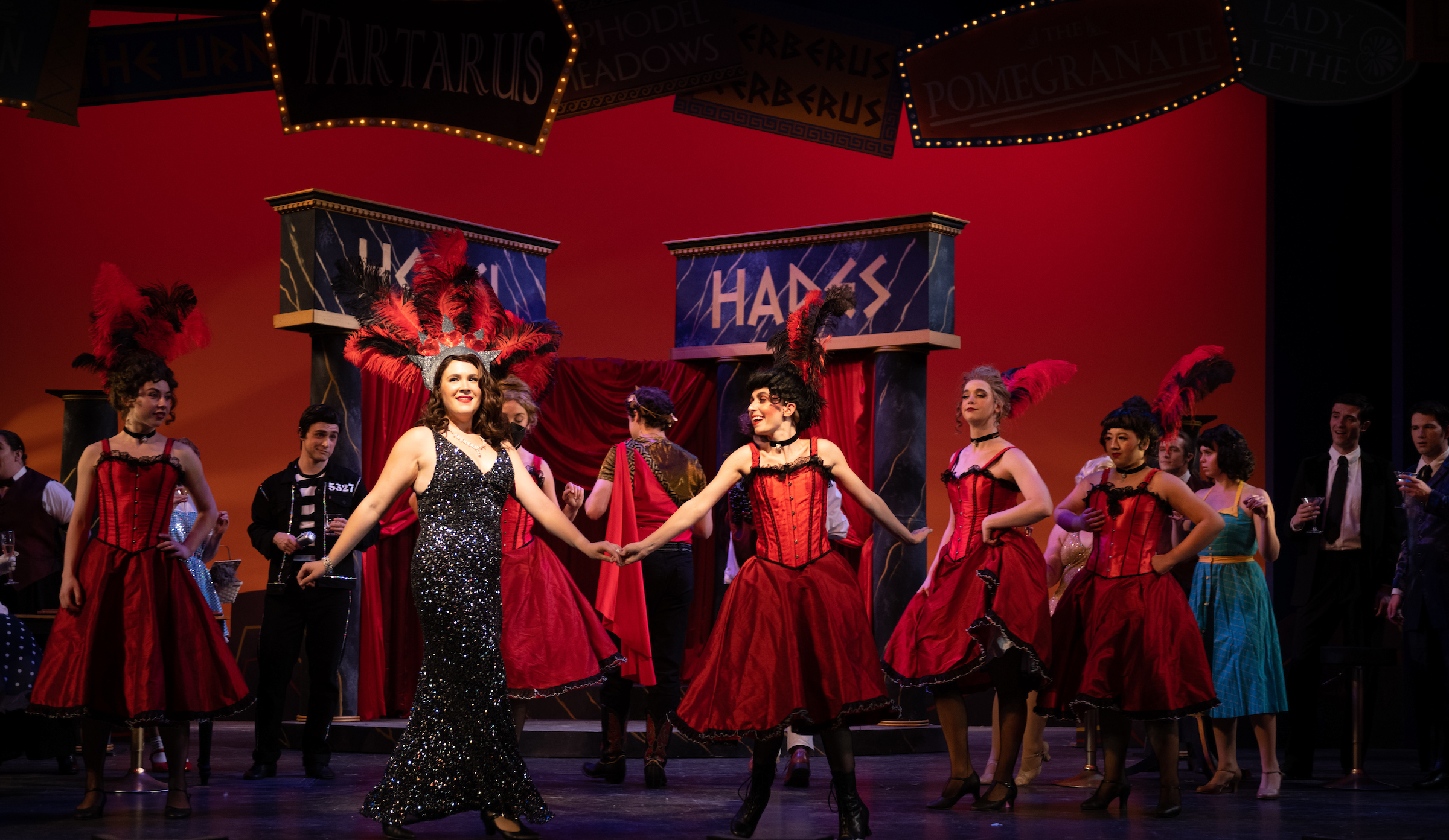
Orpheus in the Underworld
(1858)
Music Jacques Offenbach
Original French Libretto Hector Crémieux and Ludovic Halévy
English Translation Richard Traubner
Edited and adapted by Steven A. Daigle
Public Opinion enters and informs the audience that it is her duty to society to keep the theatrical setting of this entertainment morally sound. Eurydice is bored to death with her fiddle-playing husband Orpheus and is having an affair with the shepherd Aristeus (Pluto, god of the Underworld, in disguise). Orpheus is also guilty of infidelity. He has been giving more than just violin lessons to his students. Out of spite, Orpheus sets a trap for Aristeus in a wheat field. Aristeus knows of Orpheus’ trap and uses it as a means to “kill” Eurydice, thus bringing her to Hades. As Eurydice dies, Aristeus reveals himself as Pluto, and she is delighted to accompany him to the Underworld. Orpheus is thrilled to find out about Eurydice’s recent departure. Now he can spend more time with his students. But Public Opinion insists that he go with her to Mount Olympus to plead for his wife’s return. On Olympus, Jupiter tries to instill good behavior in the other deities. His attempts are thwarted by their reminding him of his own innumerable amorous adventures. Public Opinion and Orpheus arrive. Jupiter decides to investigate the affair between Pluto and Eurydice personally and descends to the Underworld with the rest of the gods. Eurydice is kept in seclusion and guarded by the dimwitted former King of Beotia, John Styx. Eurydice, bored with her confinement, accepts the advances of Jupiter, who disguises himself as a fly to get into her room. Orpheus arrives, and Jupiter allows him to have Eurydice back, provided that he does not turn and look at her. Then, to make sure that he does look, he hurls a thunderbolt at Orpheus’ feet. Eurydice decides to become a Bacchante, and all join in the famous can-can.
Conductor Michael Borowitz
Stage Director Steven A. Daigle
Choreographer Spencer Reese
Scenic Designer Daniel Hobbs
Costume Designer Brooke Kesler
Lighting Designer Brittany Shemuga
Sound Designer Christopher Plummer
Associate Sound Designer Rainey Alexiev
Stage Manager Sami Hansen
Assistant Stage Director Patrick Polsin
Public Opinion Bergen Price
Orpheus Jack Murphy
Eurydice Christine Price
Pluto/Aristeus Nicholas Orth
Diana Lily Graham
Jupiter Vincent Gover
John Styx James Mitchell
Juno Michelle Pedersen
Mars Nathan Seldin
Venus Tzytle Steinman
Cupid Sara Lucille Law
Mercury Margaret Langhorne
Minerva Elizabeth Stassen
Cybele Madison Barrett
Morpheus Davian Raggio
Bacchus Owen Malone
Vesta Meg Johnson
Hebe Sadie Spivey
Fortuna Sophia Masterson
Ceres Louisa Waycott
Nike Julia Fedor
Faunus Benjamin Rorabaugh
Apollo Spencer Reese
Neptune Charles Austin Piper
Vulcan Matthew Mueller
Ensemble: Madison Barrett, Julia Fedor, Meg Johnson, Margaret Langhorne, Sara Lucille Law, Owen Malone, Sophia Masterson, Matthew Mueller, Michelle Pedersen, Charles Austin Piper, Davian Raggio, Spencer Reese, Benjamin Rorabaugh, Nathan Seldin, Sadie Spivey, Elizabeth Stassen, Tzytle Steinman, Louisa Waycott
2022 Season

Cinderella
(1957)
Music by Richard Rodgers
Lyrics by Oscar Hammerstein II
Adapted for the stage by Tom Briggs
From the teleplay by Robert L. Freedman
When Richard Rodgers, following his 1942 breakup with lyricist Lorenz Hart and Hart’s death the following year, teamed with Oscar Hammerstein II on a show originally titled Away We Go! it was with a sense that they were writing, as Rodgers put it, “a different kind of musical.” There was hardly an expectation, however, that they would revolutionize the American musical and dominate Broadway for the next two decades. Beginning in 1943 with the (retitled) Oklahoma! the team cranked out—at precise two-year intervals—Carousel, Allegro, South Pacific, The King and I, Me and Juliet, and Pipe Dream. The last two were received less than favorably by both the press and public. But it wasn’t long after Pipe Dream closed in June, 1956 that Julie Andrews’ agent contacted Rodgers to inquire whether he and Oscar might be interested in crafting for her a television version of the Cinderella story. They knew that Andrews, about six months into her acclaimed portrayal of Eliza Doolittle in My Fair Lady, was now “hot property” and thus they jumped at the opportunity. A few years before, she had actually auditioned for, but failed to secure, a role in Pipe Dream, although Rodgers had taken positive note of her singing.
CBS, in a complex arrangement with Rodgers and Hammerstein, secured the right to broadcast the show, which they saw as a chance to one-up NBC, which had scored big with live broadcasts, in 1955 and 1956, of Peter Pan with Mary Martin. Making his television debut, Jon Cypher—a quarter-century later assuming the role of Police Chief Fletcher Daniels on Hill Street Blues—was cast as the Prince. Howard Lindsay—co-librettist a few years later of The Sound of Music—played the King; his wife Dorothy Stickney, the Queen; Edie Adams, the Fairy Godmother; Ilka Chase, the stepmother; and Kaye Ballard and Alice Ghostley, the stepsisters. Rehearsals began on February 24, 1957, with Andrews available only on days and afternoons when My Fair Lady was not playing. Without the benefit, as was common for Broadway shows, of an out-of-town tryout, the cast ran through two fully-staged performances, on March 17 and 24, which were recorded as private black-and-white kinescopes. The live one-time-only public broadcast, in color, on Sunday evening, March 31, was reputedly seen by a staggering 107 million viewers, the most watched program in television history. To be more precise, the eastern part of the country saw the show in color, whereas the West—on one-hour delay—had to make do with a black and white kinescope taken from the color broadcast. This performance date was—coincidentally or not—the 14th anniversary of the opening of Oklahoma! which would have had to play 130 years to draw the audience that Cinderella did in one evening. The program preempted the ever-popular Ed Sullivan Show, which, the week before, had featured Rodgers and Hammerstein as guests.
In 1965, five years after Hammerstein’s death, Rodgers commissioned a new Cinderella teleplay, hired 18-year-old Lesley Ann Warren for the title role, and surrounded her with a star-studded cast, including Ginger Rogers, Walter Pidgeon, and Celeste Holm, with Stuart Damon (later of General Hospital fame) as the Prince. A third television version appeared in 1997 and featured Brandy, Whitney Houston, Jason Alexander, Whoopi Goldberg, Bernadette Peters, and Victor Garber. It is this version that inspired Ohio Light Opera’s current production, which features virtually all the songs from the original 1957 broadcast, in addition to two interpolated numbers from the Rodgers musical canon: “The Sweetest Sounds” from the 1962 musical No Strings and “There’s Music in You,” written for the 1953 film Main Street to Broadway, and performed there by Rodgers and Hammerstein themselves, assisted by Mary Martin.
Conductor Michael Borowitz
Director & Choreographer Spencer Reese
Scene Designer Daniel Hobbs
Costume Designer Suwatana Rockland
Lighting Designer Daniel Huston
Sound Designer Christopher Plummer
Assistant Director James Mitchell
Cinderella* Alexa Lowrey
Fairy Godmother Lauren Nash Silberstein
Stepmother Michelle Pedersen
Grace Sarah Best
Joy Abby Kurth
Christopher Jonathan Heller
Lionel Benjamin Krumreig
Queen Constantina Gillian Weatherford
King Maximillian Mark Hosseini
Four White Horses Sadie Spivey, Lily Graham,
Emilia Perrotta, Joelle LaChance
Young Girl Sadie Spivey
Older Sister Emilia Perrotta
Younger Sister Lily Graham
Younger Sister Scott Johnson
Butcher Matthew Reynolds
Fruit Seller Joelle LaChance
Flower Girl Lindsay Ulrich
Cheese Merchant James McCarthy
Baker Marcus Huber
Footmen Marcus Huber, Scott Johnson
Ensemble
Lily Graham, Mark Hosseini, Marcus Huber, Scott Johnson, Benjamin Krumreig, Joelle LaChance, James McCarthy, Emilia Perrotta, Matthew Reynolds, Sadie Spivey, Lindsay Uhrich, Gillian Weatherford
*Understudy: Lily Graham
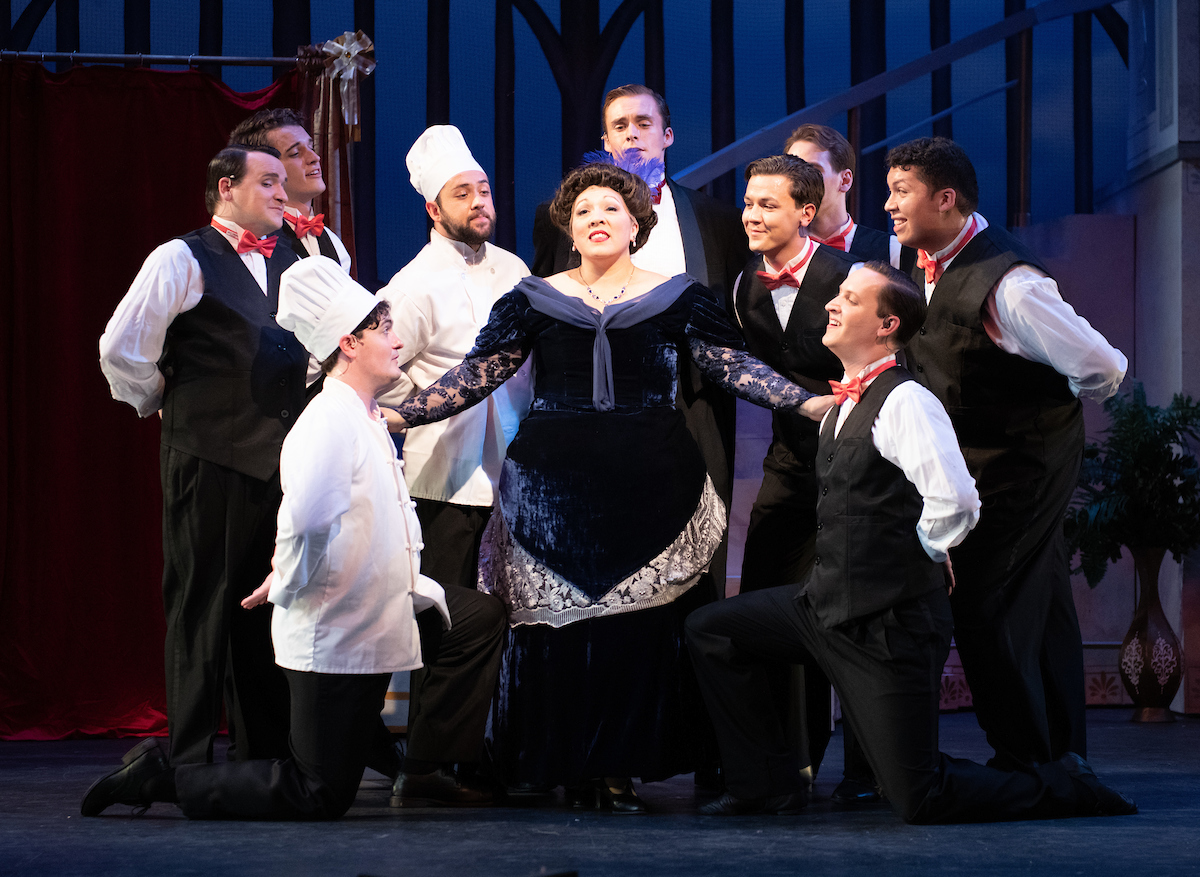
Hello Dolly!
(1964)
Music and Lyrics by Jerry Herman
Book by Michael Stewart
Based on the play The Matchmaker by Thornton Wilder
“My most beloved show—Hello, Dolly!—was a horrendous experience.” “It was nothing but headache.” “I have horror stories about that show that would curl your hair.” “The Dolly! period was the most difficult time of my life.” “It took me 30 years before I could feel absolute joy and pleasure in having written Hello, Dolly!” Hardly the words you would expect to hear from the composer/lyricist of the show that became the longest-running in Broadway history. It all started when Jerry Herman was summoned to the office of legendary Broadway producer David Merrick, who was seeking a composer/lyricist to team with librettist Michael Stewart on a musical version, featuring Ethel Merman, of Thornton Wilder’s play The Matchmaker, which Merrick had produced on Broadway in 1955. Herman, in his autobiography, recounts his knee-buckling experience in coming face-to-face with the producer about whom he had heard “all those terrifying stories about what a monster” he was. Merrick provided Herman with a draft script of the show, and gave the composer three days to create some sample tunes. Merrick had been duly impressed with Herman’s 1961 hit show Milk and Honey—then still running on Broadway—and was even more impressed when Herman returned after a frantic weekend with four songs: “Call on Dolly,” “I Put My Hand In,” “Put On Your Sunday Clothes,” and “Dancing.” Joined by actress Alice Borden, Herman regaled Merrick with the four tunes, and encores of each, to which the “producer from hell” replied: “Kid, the show is yours.” So far … so good.
Six months later, in the summer of 1963, with the show then titled Dolly: A Damned Exasperating Woman, Merrick contacted Ethel Merman to set up a meeting for her to hear the score. The reigning queen of Broadway flatly refused the offer—she had tired of the eight-shows-a-week grind and wanted “to have some fun.” Herman and Stewart were utterly distraught—they had crafted the show for Merman’s stage persona and voice. At this point, however, there was no turning back. Dolly! director Gower Champion first suggested established star Nanette Fabray, but eventually the production team settled on Carol Channing, who had shot to fame in the 1948 Broadway revue Lend an Ear and in the 1949 musical Gentlemen Prefer Blondes. Herman had some serious music rewriting to do, for as Channing reminded him: “I sing lower than most of the men in your show.” But Channing and Herman hit it off splendidly and became lifelong friends. Hello, Dolly! opened in Detroit, in a pre-Broadway tryout, on November 18, 1963. “We thought we had a hit—and the Detroit critics killed us,” relates Herman. Merrick, fearing a costly flop when (or if) the show made it to Broadway, blamed Herman for “this awful, embarrassing show,” completely contradicting his earlier enthusiasm for the musical score. To further add to the insult, and as a scare tactic, Merrick brought in other composers and lyricists to work with Herman, including Bob Merrill (composer/lyricist of Carnival) and Charles Strouse and Lee Adams (composer and lyricist, respectively, of Bye, Bye, Birdie). After collaborations on a few songs, they all left and calm was restored among the team.
Herman saw the show’s title song—for many, Broadway’s quintessential show anthem—as “the moment when this lady … finally gets the guts … to face the world again.” Six weeks before the show opened on Broadway, and as a promotional device, Louis Armstrong recorded the tune and created a sensation. It reached Number 1 on the Billboard charts, nudging out the Beatles’ 14-week hold on that coveted position, and became the best-selling single of Armstrong’s career, to say nothing of boosting ticket sales for the approaching Broadway run (premiere: January 16, 1964), which garnered very positive, but not unanimously rave, reviews. But the 2844 performances and lasting popularity speak for themselves.
Conductor Wilson Southerland
Director Jacob Allen
Choreographer Spencer Reese
Scene Designer Kiah Kayser
Costume Designer Cindy Moon
Lighting Designer Brittany Shemuga
Sound Designer Christopher Plummer
Assistant Director James Mitchell
Mrs. Dolly Gallagher Levi Michelle Pedersen
Ernestina Money Abby Kurth
Ambrose Kemper Benjamin Krumreig
Horace Vandergelder Vincent Gover
Ermengarde Gillian Weatherford
Cornelius Hackl Spencer Reese
Barnaby Tucker Jonathan Heller
Irene Malloy Sarah Best
Minnie Fay Joelle LaChance
Mrs. Rose Lauren Nash Silberstein
Rudolph James McCarthy
Judge Mark Hosseini
Court Clerk James Mitchell
Stanley Marcus Huber
Ensemble
Edward Ferran, Mark Hosseini, Marcus Huber, Scott Johnson, Abby Kurth, Alexa Lowrey, James McCarthy, James Mitchell, Emilia Perrotta, Noah Rogers, Lauren Nash Silberstein, Sadie Spivey, Lindsay Uhrich, Gillian Weatherford

The Student Prince
(1924)
Music by Sigmund Romberg
Book & Lyrics by Dorothy Donnelly
Based on the play Old Heidelberg by Wilhelm Meyer-Förster
When The Student Prince opened at Jolson’s 59th Street Theatre on December 2, 1924, Will Rogers was starring in the Ziegfeld Follies, Fred and Adele Astaire in Lady, Be Good!, Ethel Barrymore in The Second Mrs. Tanqueray, Lunt and Fontanne in The Guardsman, Marilyn Miller in Peter Pan, and the Marx Brothers in I’ll Say She Is. Irving Berlin was presenting the fourth annual Music Box Revue, Rose Marie was going strong, and Abie’s Irish Rose was in its third year. This partial roster of stars and hit shows recalls one of the liveliest periods in the history of Broadway. Prosperity stimulated box office sales; the Depression and competition from talkies were several years in the future, and the sun never set on the Shubert theatrical empire. That empire was expanded by the prolific Sigmund Romberg (1887–1951). A student of civil engineering and music in Vienna, he chose the latter for a career in spite of parental objections. Emigrating from his native Hungary to New York in 1909, he scratched out a living as a pianist and orchestra leader in various restaurants. Some of his piano compositions came to the attention of J. J. Shubert, who hired him as a staff composer. As such, he contributed to other composers’ shows (for example, Kálmán’s 1916 Her Soldier Boy) and to revues. Between 1914 and 1917, Romberg wrote 275 numbers for 17 Broadway shows. Maytime (1917), an adaptation of a German operetta, had a run of 492 performances and enhanced Romberg’s prestige. Blossom Time (1921), a reworking of a Viennese operetta (with a score based on familiar themes by Franz Schubert), had an even longer run and confirmed his status as the Shubert Brothers’ star composer.
The Shuberts, nevertheless, were unhappy with Romberg during the run-up to The Student Prince. As historian Gerald Bordman puts it, they were “aghast at what they considered Romberg’s operatic music, appalled at the unhappy ending, and utterly bewildered by Romberg’s demand for a large, strong-voiced male chorus rather than a long line of feminine beauties.” At one point they removed his name from the billing, but Romberg sued successfully to have it restored before the premiere. The producers’ worries vanished with the rave notices the show received. The New York Times, for example, headlined its review: “Prodigious operetta … magnificently sung.” It ran for 608 performances, and nine touring companies took it across the country. In 1927, Ernst Lubitsch directed a silent film version, starring Ramon Novarro, Norma Shearer, and Jean Hersholt. Mario Lanza’s voice was heard on the soundtrack of the 1954 version, which featured Edmund Purdom and Ann Blyth. Dorothy Donnelly, an actress-turned-writer who had adapted the book for Blossom Time, based the text on Old Heidelberg, a play popularized in this country at the turn of the century by actor Richard Mansfield, a matinee idol of the time. An earlier musical version of the story was heard in Milan in 1908: Eidelberga mia! The sold-out houses for Ohio Light Opera’s six previous productions of The Student Prince attest to its enduring appeal. The story of a young prince who chooses duty over love triggers recollections for most adults of difficult choices made when young, and prompts musings of what might have been. For college graduates, the interpolation of the venerable student song “Gaudeamus igitur” summons visions of golden days, and only the cold-hearted can resist the youthful ardor of the “Serenade” and the tenderness of “Deep in My Heart, Dear.”
Conductor Michael Borowitz
Director Jacob Allen
Choreographer Spencer Reese
Scene Designer Daniel Hobbs
Costume Designer Jennifer Ammons
Lighting Designer Brittany Shemuga
Sound Designer Christopher Plummer
Assistant Director Michelle Pedersen
Four Lackeys Edward Ferran, Scott Johnson,
Noah Rogers, James McCarthy
Prime Minister von Mark Jonathan Heller
Doctor Engel Mark Hosseini
Prince Karl Franz* Benjamin Krumreig
Gretchen Gillian Weatherford
Ruder James Mitchell
Toni Spiro Matsos
Lutz Vincent Gover
Hubert Noah Rogers
Count Hugo Detlef** Marcus Huber
Von Asterberg*** Edward Ferran
Lucas James McCarthy
Kathie**** Lauren Nash Silberstein
Grand Duchess Anastasia Michelle Pedersen
Princess Margaret Sarah Best
Captain Tarnitz Matthew Reynolds
Baron Arnheim Scott Johnson
Countess Leyden Abby Kurth
Ensemble
Sarah Best, Edward Ferran, Lily Graham, Jonathan Heller, Marcus Huber, Scott Johnson, Abby Kurth, Joelle LaChance, Alexa Lowrey, James McCarthy, James Mitchell, Michelle Pedersen, Emilia Perrotta, Matthew Reynolds, Noah Rogers, Lindsay Uhrich, Gillian Weatherford
* Understudy: Marcus Huber
** Understudy: Edward Ferran
*** Understudy: Scott Johnson
**** Understudy: Emilia Perrotta
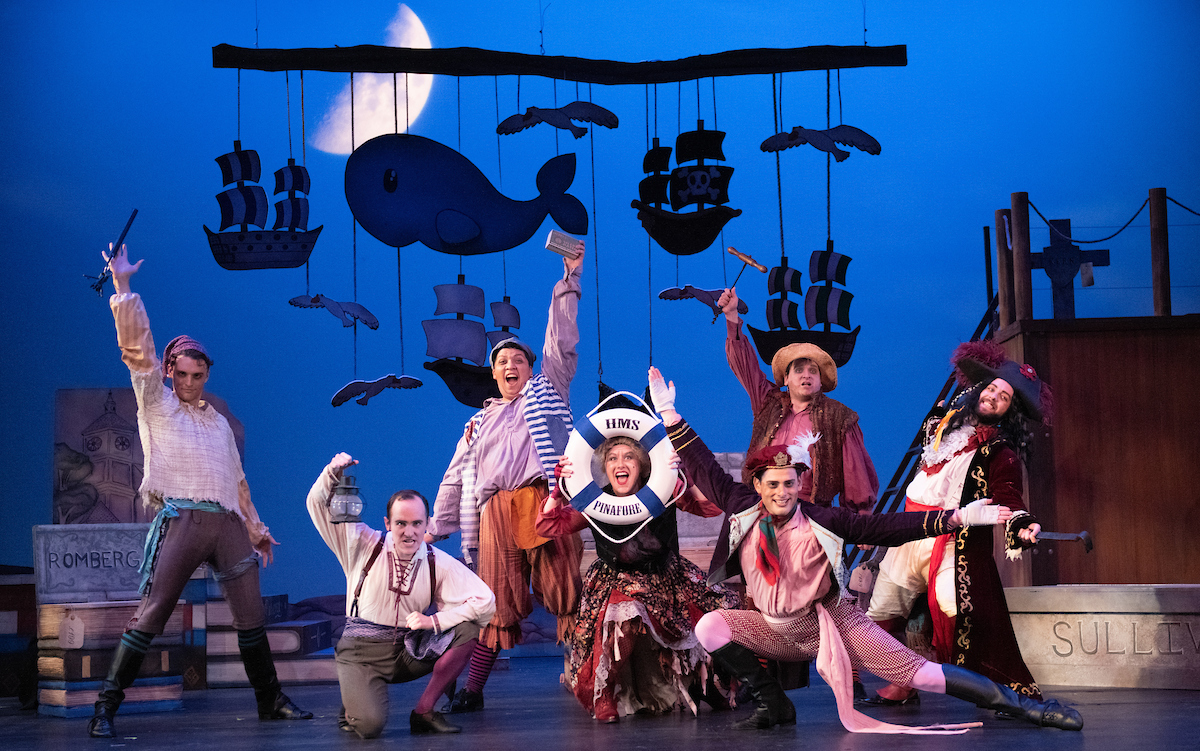
The Pirates of Penzance
(1879)
Music by Arthur Sullivan
Libretto by William Gilbert
The Pirates of Penzance originated as part of the strategy devised by Gilbert, Sullivan, and D’Oyly Carte to retaliate against unauthorized American productions of H.M.S. Pinafore. Resolving to bring their own Pinafore company to New York—confident that it would drive shabby imitations off the market—the trio also planned to give the premiere of a new comic opera, thereby trying to establish a legal claim for its royalties in this country. Before departing for New York, Sullivan had completed sketches for the first act, but on arrival discovered that he had left them at home. Rehearsals began while he was completing the second act and reconstructing the first in a series of all-nighters. He did not finish the overture until 5:00 a.m. the day of the premiere; Gilbert, among others, assisted in the copying of parts. The first performance at W.T. Ford’s Fifth Avenue Theatre on December 31, 1879 was a grand success. Sullivan wrote to his mother: “The laughter and applause continued through the whole piece until the very end, and then there were thunder calls for Gilbert and myself.” The day before, on December 30, a bizarre production of Pirates had been mounted at the Royal Bijou Theatre in Paignton, Devonshire to establish the British copyright. A touring Pinafore company managed by Helen Lenoir (who later married Carte), using an incomplete version, Pinafore costumes, and piano accompaniment, gave what the poster misleadingly proclaimed as the first performance “in any country.” The young Richard Mansfield, later to star in Old Heidelberg, played the Major-General. Carte’s New York production of Pinafore had disappointing box office returns (perhaps the Pinafore mania that had swept the country had peaked), but Pirates was a winner. While the show was still running at the Fifth Avenue Theatre, Carte organized three touring companies; Sullivan conducted the opening nights in Philadelphia, Newark, and Buffalo. The Third Company performed in Cleveland, Akron, and Columbus in May 1880. Wooster audiences first heard it in a town-grown production at the City Opera House in February 1890.
Gilbert and Sullivan returned to England in March 1880 and immediately began rehearsals for the London premiere, which took place at the Opera Comique on April 3, with a revised overture and act-two finale (a reprise of “Poor Wand’ring One” replaced a variation of the Major-General’s patter song heard in New York). The audience demanded encores of nearly every number, and the partners were called before the curtain at the end of each act. Like H.M.S. Pinafore and The Mikado, The Pirates of Penzance has undergone a variety of adaptations over the years. Kevin Kline and Linda Ronstadt romped through a tongue-in-cheek version in 1980 that ran for 787 performances, the longest run ever of a G & S operetta. In 2006, a Yiddish-language Pirates in New York City had the gang requesting not pirate sherry, but bagels and seltzer. That same year, at Connecticut’s Goodspeed Opera House, a free-wheeling production that shamelessly stole from Pirates of the Caribbean had a Pirate King who seemed “to be dipped in Depp,” according to Variety.
Conductor Wilson Southerland
Director Steven Daigle
Choreographer Spencer Reese
Scene Designer Kiah Kayser
Costume Designer Cindy Moon
Lighting Designer Daniel Huston and Rachel Aho
Sound Designer Eli Oldt
Assistant Director James Mitchell
Major-General Stanley Vincent Gover
The Pirate King* Mark Hosseini
Samuel Jonathan Heller
Frederic** Spencer Reese
Sergeant of Police James McCarthy
Mabel *** Sadie Spivey
Edith Emilia Perrotta
Kate Lindsay Uhrich
Isabel Lily Graham
Ruth Abby Kurth
Ensemble
Sarah Best, Edward Ferran, Lily Graham, Jonathan Heller, Marcus Huber, Scott Johnson, Benjamin Krumreig, Alexa Lowrey, James McCarthy, James Mitchell, Emilia Perrotta, Matthew Reynolds, Noah Rogers, Lauren Nash Silberstein, Lindsay Uhrich, Gillian Weatherford
* Understudy: Matthew Reynolds
** Understudy: Marcus Huber
*** Understudy: Lily Graham
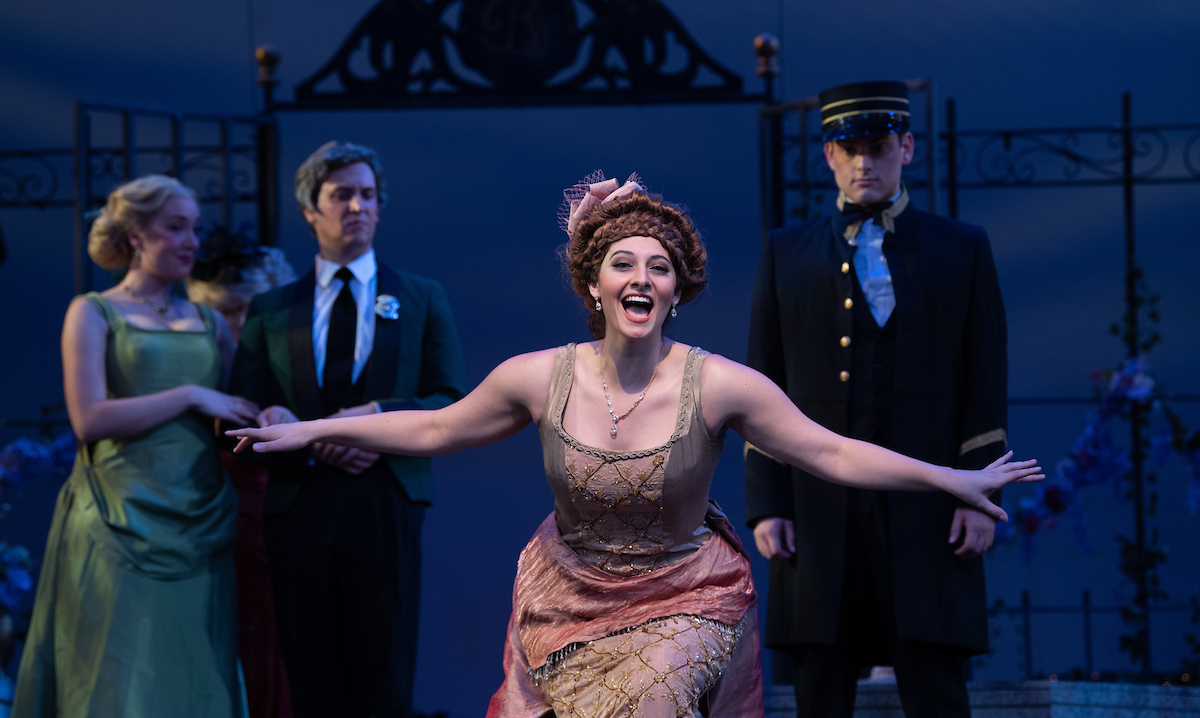
The Mock Marriage
(1904)
Music by Franz Lehár
Original German Libretto by Julius Bauer
English Lyrics by Gregg Opelka
English Dialogue by Steven Daigle
Franz Lehár was born on April 30, 1870 in Komárom, Hungary, on the south bank of the Danube, just across the river from Slovakia. Following in his father’s footsteps, he studied music and began his career as an orchestral musician and then bandmaster. As with so many operetta composers, Lehár tried his hand—in the 1890s—at opera, but with little success. He next took up a post as theater conductor in Trieste and, upon his father’s death in 1898, assumed the elder’s position as a bandmaster in Budapest. After a couple of misfires (the incomplete Arabella and The Club Baby) in an attempt to break into the operetta world, he finally made it onto the Vienna stage with his 1902 operetta Wiener Frauen (Vienna Women), which enjoyed a reasonable 50-performance run at the Theater an der Wien. This reception was fueled, undoubtedly, by the appearance earlier that year of Lehár’s orchestral waltz Gold and Silver, which circulated the composer’s name internationally and remains, to this day, a prime example of musical elegance in fin-de-siècle Vienna.
In March of 1904, after only 37 performances, the Carltheater in Vienna shut down its production of Lehár’s latest operetta, Der Göttergatte (The God Husband). The show had opened on January 20 as a successor to the composer’s previous show, Der Rastelbinder (The Tinkerer), which had an admirable run of over 225 performances. Whereas the earlier show, folksy in nature, had taken place in current times, addressed contemporary social and cultural issues, and mirrored in its plotline Lehár’s own rise from humble beginnings, Der Göttergatte dealt with intrigues among the Greek gods and was crafted in the style of Offenbach. The differences in the two works, both in style and in critical and popular reception, left him searching for the right composing “formula.” Lehár saw his ignorance of the genre as an “advantage, because it enabled me to form my own operetta style.” The last five years of the 19th century had seen the deaths of the four giants of Viennese operetta: Johann Strauss, Franz von Suppé, Karl Zeller, and Karl Millöcker. Lehár “felt a calling to redeem the genre that had been languishing for years.”
Die Juxheirat (The Mock Marriage), which opened on December 22, 1904 at the Theater an der Wien, fulfilled that calling. Although a succès d’estime at best—and virtually unknown today—the show paved the way for Lehár’s next operetta, Die lustige Witwe (The Merry Widow), and the subsequent development in Vienna of a 20th-century operettic paradigm. In no other full-length work did the composer, as he did with The Mock Marriage, so deliberately draw on the burlesque traditions of operetta. This drama of mistaken identity—centering on Selma, an American billionaire’s daughter and president of the anti-male society WHAM! (Women Hate All Men!)—is full of topical allusions. It is set in America, the land of technical and social progress, where, even then, all future trends were anticipated. The show deals in women’s emancipation, gender exchange, and social inequality. It channels Nietzsche, Schopenhauer, Mirza Schaffy, and Wagner (including musical quotations from Tristan und Isolde and Lohengrin, and a Meistersinger waltz).
The climax of the plot, however, is the “marriage of convenience” into which the misandrist Selma enters only because she believes the groom to be a woman disguised as a man, namely the sister of her shy admirer Harold. This same-sex marriage exists only in Selma’s imagination, because the woman disguised as a man is really a man: the shy Harold, whom Selma has so far brusquely rejected. His sister, in turn, has not only arranged this “mock marriage” in order to get her brother married, but also to take revenge on Selma for having once snatched her lover away from her.
Conductor Michael Borowitz
Director Steven Daigle
Choreographer Spencer Reese
Scene Designer Daniel Hobbs
Costume Designer Cindy Moon
Lighting Designer Rachel Aho
Sound Designer Mason Waldrip
Thomas Brockwiller James McCarthy
Selma, Baroness von Wilfort Lauren Nash Silberstein
Captain Arthur* Scott Johnson
Miss Phoebe Joelle LaChance
Miss Edith Sadie Spivey
Miss Euphrasia Michelle Pedersen
Harold von Reckenburg Benjamin Krumreig
Juliane von Reckenburg Sarah Best
Philly Kaps Jonathan Heller
Roger Huckland, sheriff Matthew Reynolds
Col. Summer Vincent Gover
General Marcus Huber
Butler Noah Rogers
Officer of the Court Edward Ferran
Ensemble
Edward Ferran, Vincent Gover, Lily Graham, Marcus Huber, Scott Johnson, Abby Kurth, Alexa Lowrey, Emilia Perrotta, Matthew Reynolds, Noah Rogers, Lindsay Uhrich, Gillian Weatherford
* Understudy: Edward Ferran
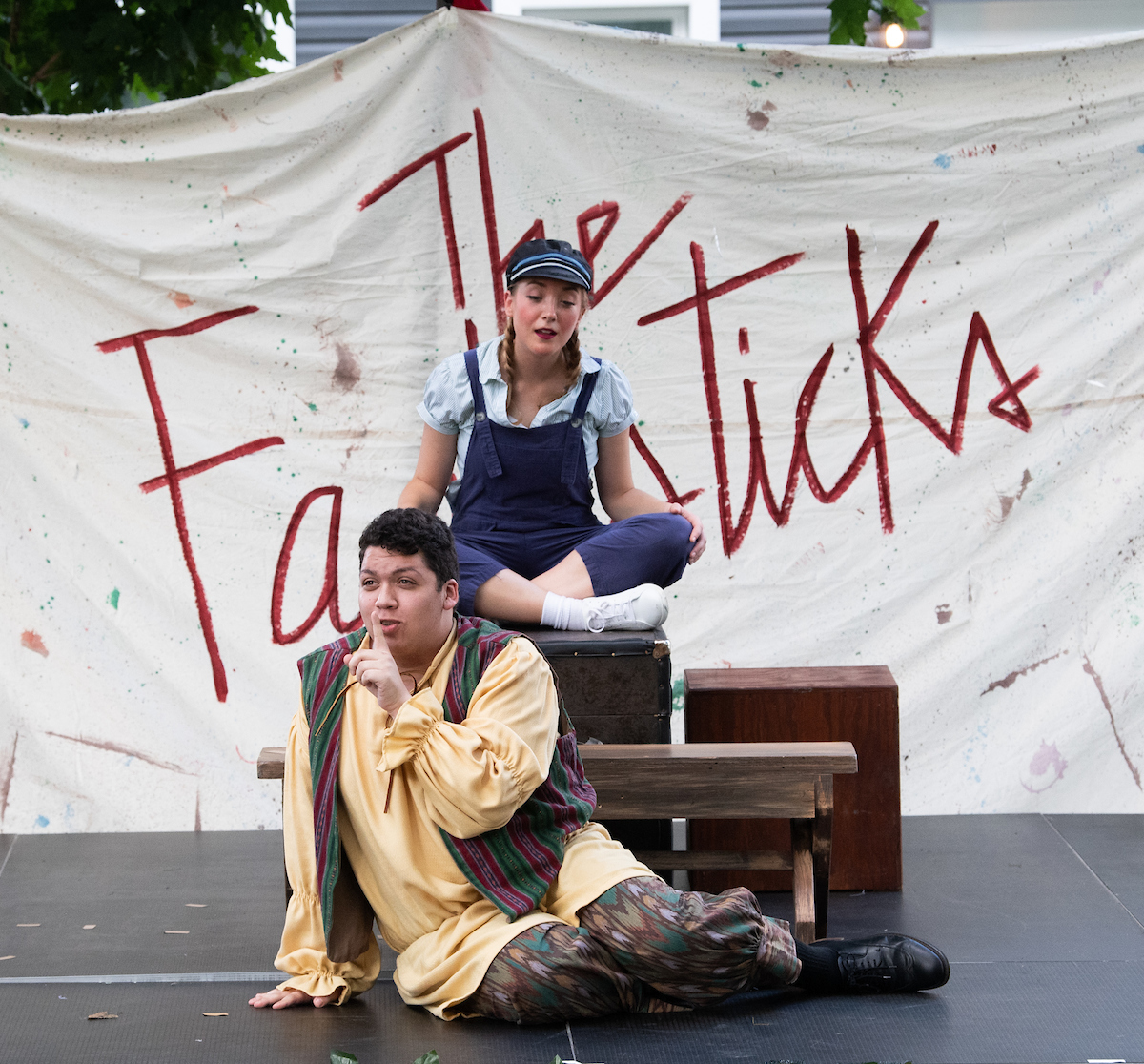
The Fantasticks
(1960)
Music by Harvey Schmidt
Book & Lyrics by Tom Jones
Suggested by the play Les Romanesques by Edmond Rostand
Bring up The Fantasticks in discussion and most people will comment on either its remarkable 42-year (17,162-performance) off-Broadway run, or on its irresistible, and instantly memorable, opening tune, “Try to Remember.” But—as with virtually all theatrical works—there was a long road that led to its opening on May 3, 1960 at Manhattan’s Sullivan Street Playhouse in Greenwich Village. In 1894, three years before his play Cyrano de Bergerac premiered in Paris and elicited more than one hour of post-final-curtain applause, Marseille-born Edmond Rostand penned a three-act play titled Les Romanesques. Written in Alexandrine verse (12-syllable lines, with stresses on the sixth and last syllables), it opened at the Comédie-Française and served as the author’s breakthrough work. In 1899, the play was translated into English, under the title The Romancers, by Mary Hendee, but drew little attention. The following year, George Fleming—pen name of Julia Constance Fletcher—crafted a second translation, but under the title The Fantasticks. Her version starred George Arliss, Gerald du Maurier, and Mrs. Patrick Campbell—all notable English actors of the day. The title apparently derives from an archaic noun form of the word “fantastic,” meaning “eccentric.” In their 1991 book on the musical, Donald C. Farber and Robert Viagas report that the “k” was added to the name “in a flight of pure whimsy.”
Fast forward half a century to about 1950 and the University of Texas at Austin, where graduate drama student, and future Fantasticks lyricist, Tom Jones was given an assignment to stage a scene from Fleming’s version of the play. A few years later, he teamed with composer Donald Robb to create a musical version of the show, titled Joy Comes to Deadhorse, which premiered in 1956 at the University of New Mexico. Although it was greeted positively, Jones and Robb totally disagreed on its merits and decided to split up. Eventually, Jones joined with composer Harvey Schmidt and stage director Word Baker, with whom he had earlier produced musicals at the University. Working with the seemingly de rigueur Rodgers and Hammerstein model for writing successful musicals, the Jones-Schmidt team labored on their version of The Fantasticks for three years, generating material for a show, but nothing that really satisfied the pair. They finally realized that the Rostand play—a parody of the Romeo and Juliet story—did not lend itself to the R&H model. As Jones related: “We threw away the entire script and score, except for a couple of songs. We decided to break all the rules. We didn’t understand them anyway.”
In 1959, the Jones-Schmidt-Baker team was invited to present their newly-crafted musical at Barnard College in Manhattan. As part of a triple bill, the show had to be cut to a single act. Future Broadway star Susan Watson was engaged for the role of Luisa. Present, serendipitously, at one of the rehearsals was a gentleman named Lore Noto, who not only agreed to help raise financing for the show, but wanted it expanded to full-length and was willing—as the show’s producer—to give the trio virtually complete artistic control. The “serendipity” lies in the trio’s willingness to accept Noto’s offer over those of two other interested producers, both with better track records: Noto’s only experience as a producer had been a one-performance failure titled The Failures.
The Fantasticks opened to mixed reviews, lukewarm from the critical Times and Tribune, but glowing from the magazines and weekly periodicals. More serendipity … a month after the opening, Broadway actors went on strike for 11 days. That left off-Broadway as the prime entertainment in town. Business increased and continued to do so after the strike ended, aided—as Jones points out—by the presence in the audience of the likes of Richard Rodgers, Jerome Robbins, Gower Champion, David Selznick, Vivien Leigh, and Sir John Gielgud.
Finally … it is worth taking note of Tom Jones’ recollection of composer Harvey Schmidt’s creation of “Try to Remember”: “He … was trying to compose something … complex…. Finally, he decided to stop and give himself a rest…. He sat at the piano and played ‘Try to Remember’—the complete melody and all of the chords…. It just poured out, a gift from some mysterious muse of music. And he thought, ‘My God, that’s pretty.’”
Conductor & Piano Wilson Southerland
Director Steven Daigle
Choreographer Spencer Reese
Scene Designer Kiah Kayser
Costume Designer Charlene Gross
Sound Designer Christopher Plummer
Assistant Director James Mitchell
El Gallo* Mark Hosseini
Matt Spencer Reese
Luisa Sadie Spivey
Hucklebee, Matt’s father James Mitchell
Bellomy, Luisa’s mother Joelle LaChance
Henry Vincent Gover
Mortimer Edward Ferran
The Mute Lily Graham
* Understudy: Noah Rogers
2021 Season

The Musical Magic of OLO!
The Ohio Light Opera was founded in 1979 as a Gilbert and Sullivan repertory company. By the turn of the century, the repertoire had grown to encompass 71 works from the operetta canon. Over the past 20 years, OLO has further expanded its repertoire—now at 146 titles—to include stage works of most of the greatest composers and lyricists of traditional American musical theater. Not only did innovators like Cole Porter, Irving Berlin, Rodgers & Hammerstein, and Lerner and Loewe drive the evolution of the Broadway musical, but—quite unlike the musicals of today—many of their show songs became popular hit tunes of their day. Join us in this casual cabaret performance, with full narration, as we look back at some of the most well-known and beloved songs from the mid-century musicals that OLO has produced. Songs featured include “The Impossible Dream,” “You’re Just in Love,” “My Funny Valentine,” “I’ve Got Rhythm,” and “Climb Ev’ry Mountain.”
Ensemble: Vince Gover, Mark Hosseini, Teryn Kuzma, Joelle Lachance, Elizabeth Perkins, Spencer Reese, Tanya Roberts, Caitlin Ruddy, Adam Wells, Julie Wright Costa
Song Programing by Steven A. Daigle
Narrations by Spencer Reese
Julie Wright Costa, Stage Director
Wilson Southerland, Music Director, piano
Christopher Plummer, Sound Designer
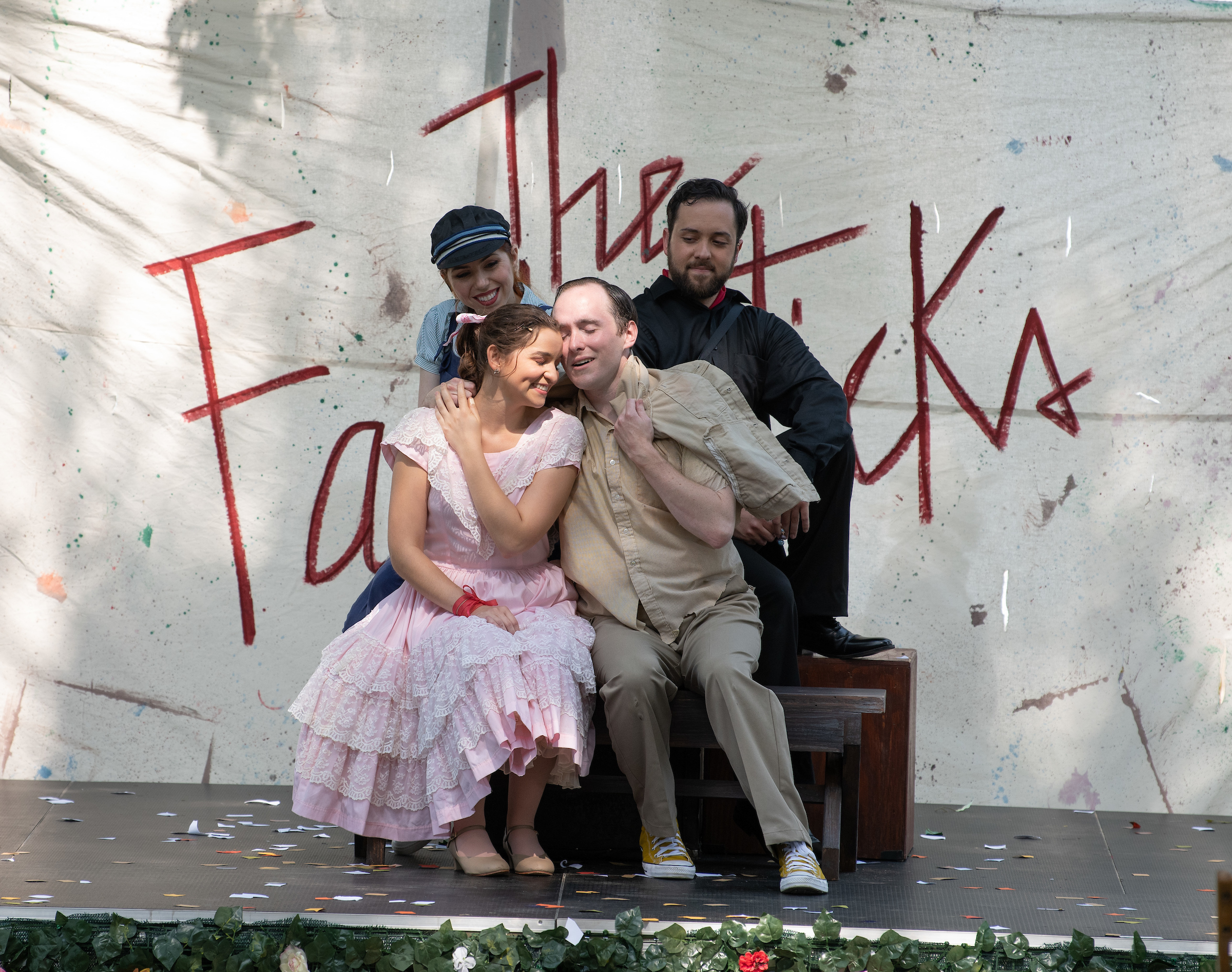
The Fantasticks
(1960)
Music by Harvey Schmidt
Book and Lyrics by Tom Jones
As related by a singing storyteller, two young neighbors, Matt and Luisa—for years nearly oblivious to each other—have grown up and fallen in love. Their feuding parents—Matt’s father and Luisa’s mother—do not approve of this relationship and have constructed a wall between their properties. The young couple have had to conduct their romance in secret. Matt’s father, despite his son’s pleas of independence, has, in fact, chosen a wife for him. Luisa’s mother intends to supplement the wall with a fence. In truth, this is all part of the parents’ plan to bring them together: forbid children from doing something, and they will do it. Matt’s father hatches a plan to end the fabricated “feud” and hasten the children’s relationship. He has hired a professional abductor, El Gallo, who will carry Luisa off. She will be gallantly rescued by Matt, with the parents so pleased that all can end happily. The scheme goes according to plan—the wall eventually comes down and all seems to be going swimmingly for both children and parents. But without the previous sense of adventure and forbidden romance, life has become too easy. Matt and Luisa want something more: he ventures out to validate his heroism and she becomes obsessed with the handsome and alluring El Gallo. It takes a full dose of the “real world” to finally convince the couple of what really matters.
Steven A. Daigle, Stage Director
Wilson Southerland, Music Director, piano
Spencer Reese, Choreographer
Charlene Gross, Costume Designer
Kiah Kayser, Scenic and Props Artisan
Christopher Plummer, Sound Designer
Cast
The Narrator (El Gallo) Mark Hosseini
The Girl (Luisa) Teryn Kuzma
The Boy (Matt) Spencer Reese
The Boy’s Father (Hucklebee) Benjamin Krumreig
The Girl’s Mother (Bellomy) Michelle Pedersen
The Old Actor (Henry) Vince Gover
The Man Who Dies (Mortimer) Adam Wells
The Mute Caitlin Ruddy
Understudy for Luisa Elizabeth Stockton Perkins
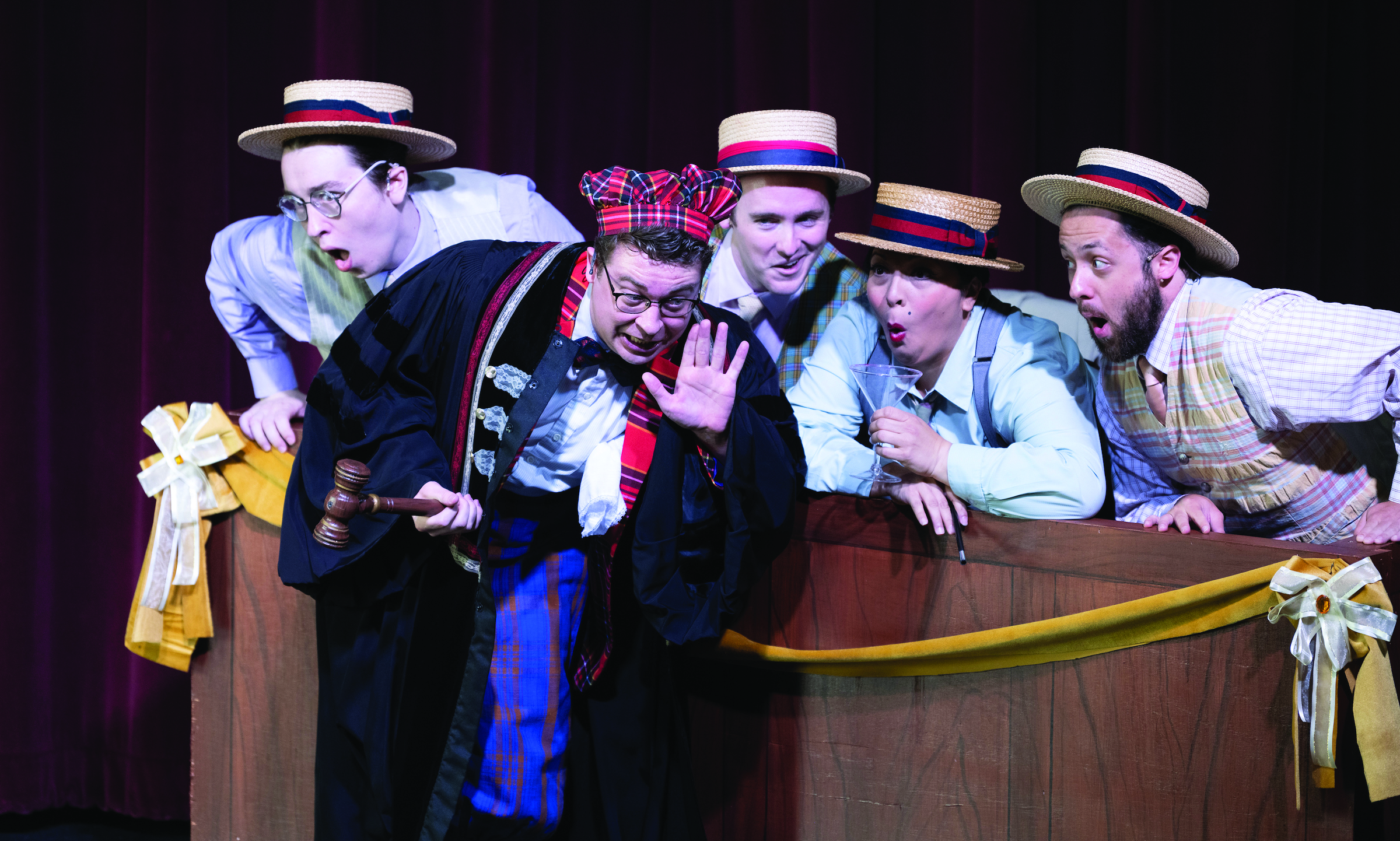
Trial by Jury
(1875)
Music by Arthur Sullivan
Libretto by William S. Gilbert
Edwin, engaged to but tiring of his sweetheart Angelina, has fallen in love with another; Angelina takes him to court for breach of promise. The court usher, while enjoining impartiality on the jury, shows a definite partiality himself for the fair plaintiff. Although both jury and judge indicate that, in their own pasts, they have had changes of heart like Edwin’s, they nevertheless have little sympathy for him. After the jury is sworn in, Angelina appears and immediately captivates the entire court. Her lawyer gives a stirring speech, and Angelina falls sobbing on the advocate’s breast. Edwin proposes various solutions, including marrying Angelina now and his sweetheart later, but her lawyer objects. Edwin tries to dissuade her from wanting to marry him at all, saying that when he is drunk he would beat her. The judge proposes that Edwin be made drunk to see whether he indeed would, but her lawyer again objects. Finally, the judge, disgusted at the proceedings and eager to get away, has his own thoughts on how best to adjudicate the case.
Julie Wright Costa, Stage Director
Wilson Southerland, Music Director, piano
Spencer Reese, Choreographer
Charlene Gross, Costume Designer
Kiah Kayser, Scenic and Props Artisan
Christopher Plummer, Sound Designer
Cast
Judge Vince Gover
Plaintiff Caitlin Ruddy
Counsel for Plaintiff Tanya Roberts
Defendant Benjamin Krumreig
Foreman of Jury Mark Hosseini
Usher Elizabeth Perkins
Participants: Vince Gover, Mark Hosseini, Benjamin Krumreig, Teryn Kuzma, Joelle Lachance, Michelle Pedersen, Elizabeth Perkins, Spencer Reese, Tanya Roberts, Caitlin Ruddy, Adam Wells
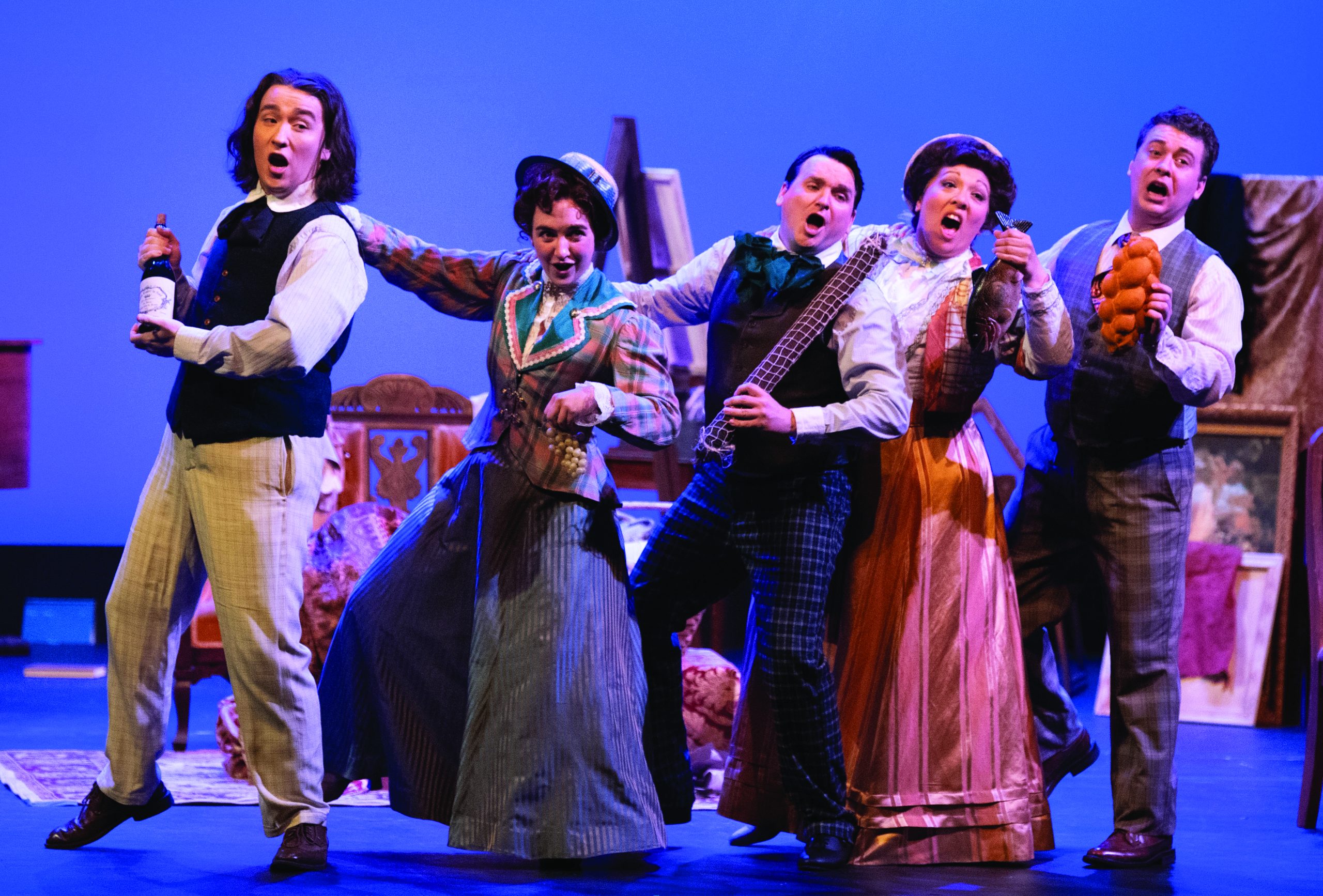
The Daring of Diane
(1907)
Music by Heinrich Reinhardt
Original English Libretto by Arthur Anderson
New Performance Edition and Revisions by Steven A. Daigle
Quite in the La Bohème fashion, three aspiring artists—the poet Prosper, the musician Severin, and the painter Julien—share a tattered garret in the heart of Montmartre. Prosper and Severin poke fun at Julien’s apparent inexperience with the opposite sex. In his defense, Julien reveals that, two weeks before, an aunt forwarded him 500 francs, with a promise of 2500 more as soon as he completed his art studies … but, under the condition that, during this time, he have no love affair. Furthermore, he reveals that, three weeks before, he had met at the Louvre a young woman named Diane—very rich and of noble background—who promised to take an interest in his art. Voices are heard from outside—it is those of grisettes Carolie and Rosalie, the girlfriends, respectively, of Prosper and Severin. The two couples rejoice in being together, while Julien laments his unhappy loveless state. Disconsolate at his easel, he can’t stop staring at the sketch that he has begun of a beautiful woman. No sooner have Carolie and Rosalie departed than Prosper and Severin decide to pay a visit to the Café Momus. Julien declines their invitation to join them. Once his friends have gone, Julien responds to a knock at the door: it is the elegantly dressed Diane, who explains that, ten years before, driven by her quest for high position, she had married a marquis. Despite her incessant attempts to win his love, he continually shunned her. Left with no alternative, she ran away to seek revenge on her husband by pretending to take a lover … namely Julien. She has left a letter for her husband, informing him of her intentions and her whereabouts. Julien now fears for his own safety, even more so when Diane doubles down by insisting that she will not leave the room until her husband has found her there. When Julien cautions her about his aunt’s stipulation of “no romance,” Diane kicks into high gear…
Steven A. Daigle, Stage Director
Wilson Southerland, Music Director, piano
Spencer Reese, Choreographer
Charlene Gross, Costume Designer
Justin Gibson, Lighting Designer
Kiah Kayser, Scenic and Props Artisan
Christopher Plummer, Sound Designer
Cast
Prosper (poet) Benjamin Krumreig
Julien (artist) Adam Wells
Severin (musician) Vince Gover
Carolie Joelle Lachance
Rosalie Michelle Pedersen
Diane Tanya Roberts
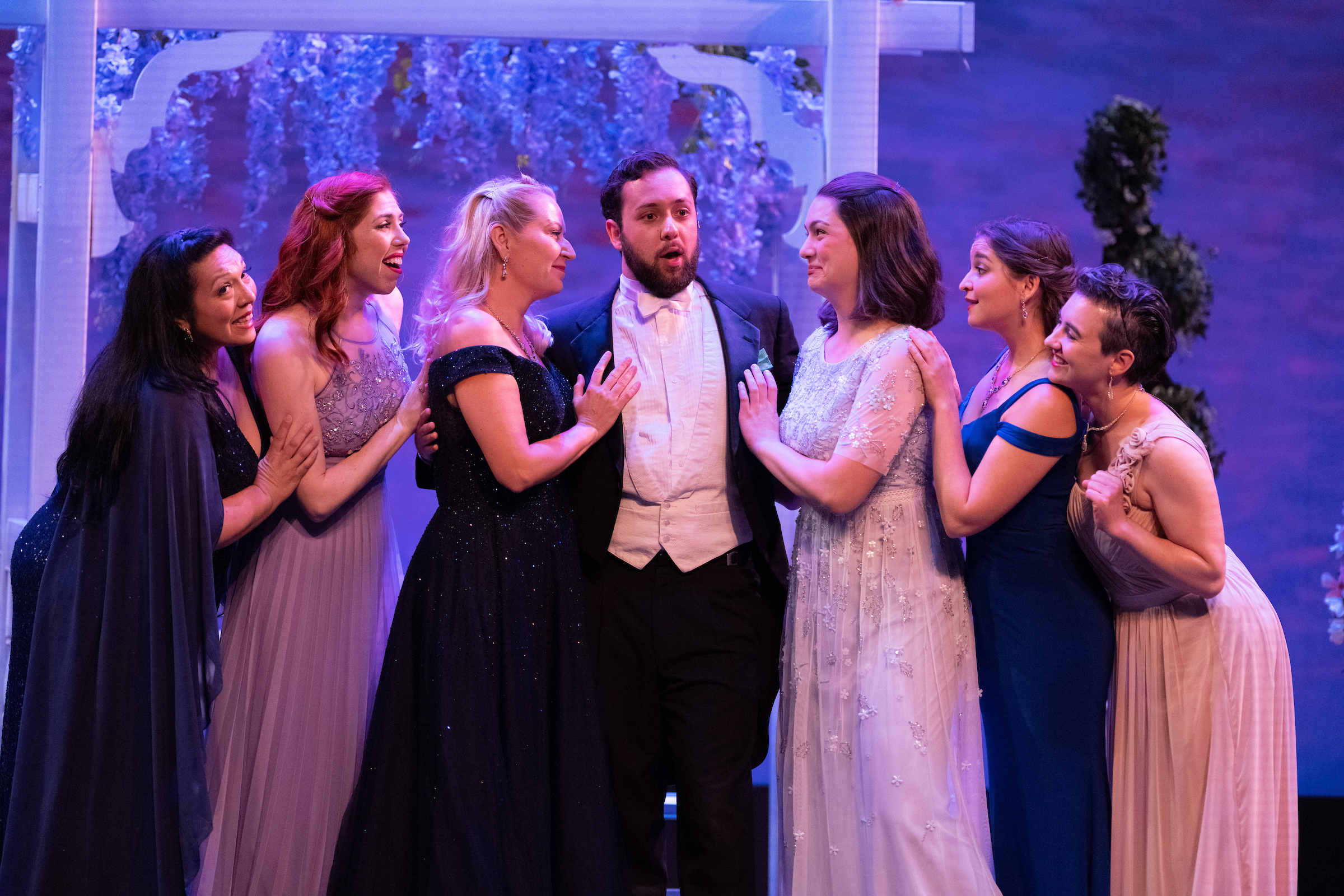
Operetta: Rare and Well Done
Since the earliest days of operetta, historical figures—famous and infamous—have served as inspiration for characters, plots, songs, and shows. The stage counterparts of these figures—from Cleopatra to Casanova, Madame Pompadour to Napoleon, Boccaccio to Goethe—have provided us history lessons, but tempered with the satirical, romantic, and glamorized stylings of operetta. OLO has taken advantage of the inactivity during the COVID crisis to craft, and secure materials for, a live-streamed concert titled Operetta: Rare and Well Done, comprising 13 songs and narration associated, in one way or another, with historical personages and events. Our goal—as with The Daring of Diane—is to chip away at those 10,000 operetta titles that OLO has yet to present on stage. Composers represented include Jacques Offenbach, Franz von Suppé, Arthur Sullivan, and George Gershwin. The historical characters range from queens to sculptors to actors to composers. Make no mistake … these songs, drawn from the French, German, British, and American repertoire, are rare! But you will be humming or knee-slapping the tunes for days.
Julie Wright Costa, Stage Director
Wilson Southerland, Music Director, piano
Spencer Reese, Choreographer
Justin Gibson, Lighting Designer
Kiah Kayser, Scenic and Props Artisan
Christopher Plummer, Sound Designer
Ensemble: Mark Hosseini, Benjamin Krumreig, Teryn Kuzma, Joelle Lachance, Michelle Pedersen, Elizabeth Perkins, Spencer Reese, Tanya Roberts, Caitlin Ruddy, Julie Wright Costa
Narration Text and Song Selections by Michael Miller
2020 Season

Ruddigore Virtual Performance
May 23 – The first of 20 virtual and archival performances that make up The Ohio Light Opera 2020 Virtual Summer Festival. We begin on Saturday by reaching into the OLO archival vaults for a complete 2015 performance of Gilbert & Sullivan’s Ruddigore.

Hail Poetry!
May 30 – Hail, Poetry! Reflections on OLO’s Mission. Join us for a virtual performance of “Hail, Poetry!” by members of our 2020 OLO Cast. In addition, a rare ninety minute archival video celebrating Emeritus Artistic Director, James Stuart and the company’s first 25 years.

Reflections on OLO’s mission
June 12 – Virtual Performance: Reflections on OLO’s mission – Messages and Songs from Our Valued OLO Veterans and an Archive Gala Presentation

Carousel Virtual Performance
June 13 – Virtual Performance: Two Selections from Carousel – OLO 2020 cast followed by Archival Video Clips Celebrating the Early American Operetta and Musical.

Damn Yankees and Carousel Virtual Performance
June 20 2:00 pm – Virtual Performance: Selections from Damn Yankees OLO 2020 cast plus archival video.
7:30 pm – Twice as Nice: a Carousel encore! Virtual Performance: New faces and different singers perform two selections from Carousel OLO 2020 cast plus archival video.

Let ’Em Eat Cake Virtual Performance
June 25 – Two Selections in Virtual Performance of Let ’Em Eat Cake and Archival Video Clips Celebrating the Early American Musical.

From the Merry Video Vault!
June 27 – “From the Merry Video Vault!” Archival Selections from past OLO Performances.

Reflections on OLO’s mission
July 3 – Reflections on OLO’s Mission Special Virtual Performances by OLO’s valued veterans and a special archive gala performance.

Fourth of July Retrospective
July 4 – Fourth of July Retrospective: Celebrating 20 years of OLO’s Fourth of July concerts in downtown Wooster with a virtual instrumental performance and memorable tunes.

The Gondoliers and Patience Virtual Performances
July 11 2:00 pm – The Gondoliers – Two virtual quartet selections in addition to Act I of OLO’s 2003 production of Gilbert and Sullivan’s The Grand Duke. 7:30 pm – Patience – Three virtual selections in addition to Act II of OLO’s 2003 production of Gilbert and Sullivan’s The Grand Duke.

Gilbert & Sullivan
July 19 – Celebrating the Topsy-Turvy world of Gilbert & Sullivan Archival Scenes from past OLO Productions.

Reflections on OLO’s mission
Aug 1 2:00 pm – Virtual Performance: Reflections on OLO’s mission – Messages and Songs from Our Valued OLO Veterans and Current Company.
7:30 pm – Archive Performances from the OLO Merry Video Vaults.

The Mock Marriage
Aug 8 2:00 pm – Two Virtual Performances of Lehár’s The Mock Marriage and OLO Archival Scenes from European Operetta! Die Fledermaus, The Merry Widow, The Count of Luxembourg, The Pirates of Penzance.

From the Merry Video Vault!
Aug 30 2:00 pm – From the Merry Video Vaults! – The Ohio Light Opera Celebrates the Operettas of Emmerich Kálmá



